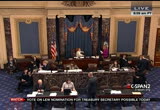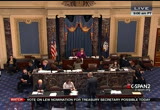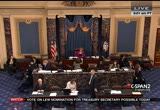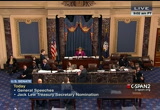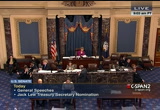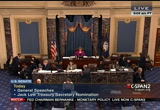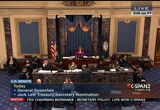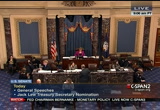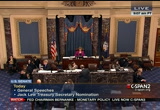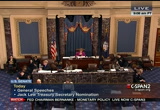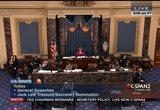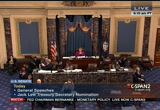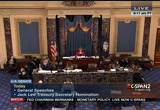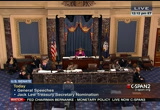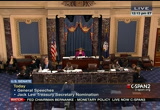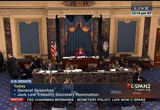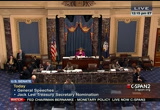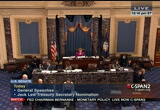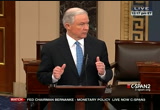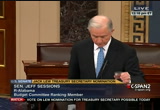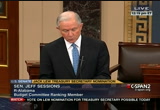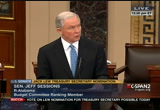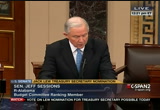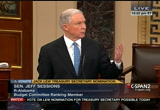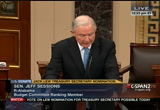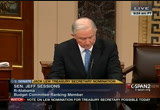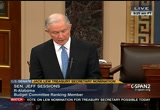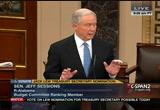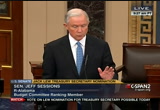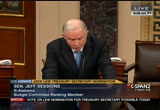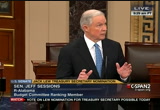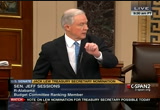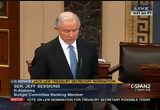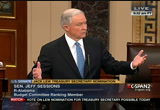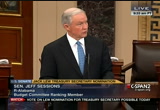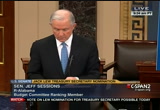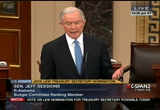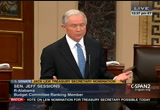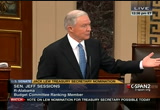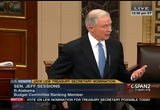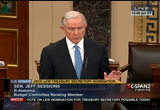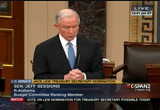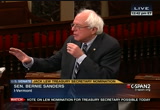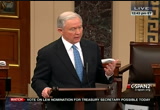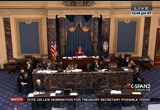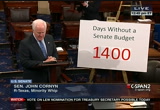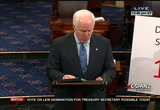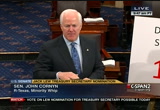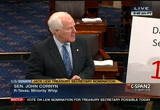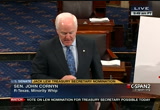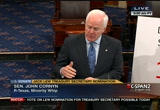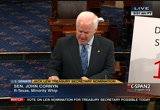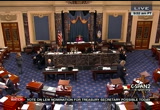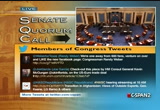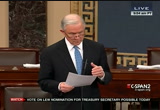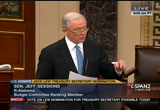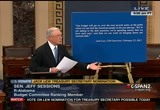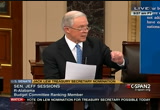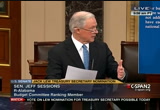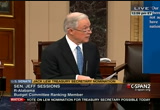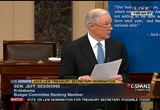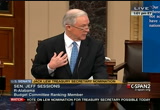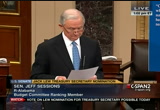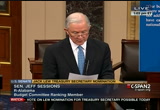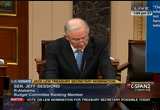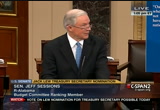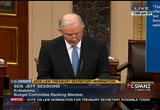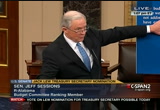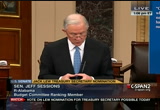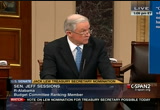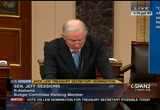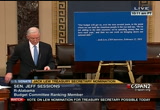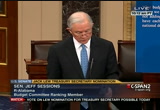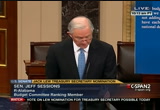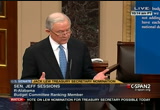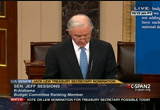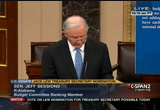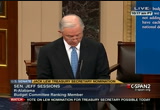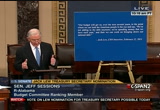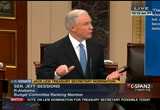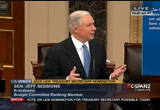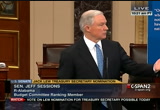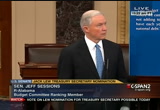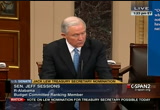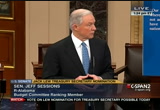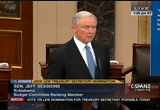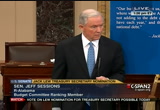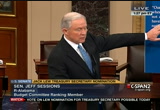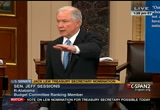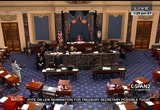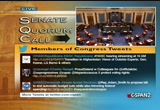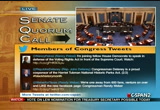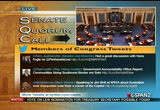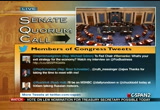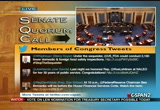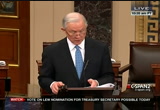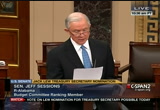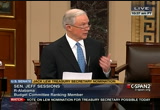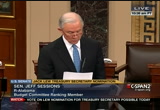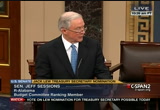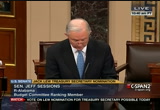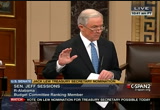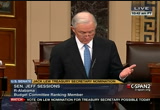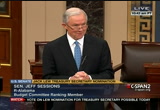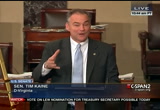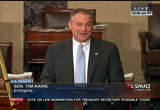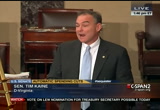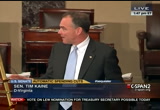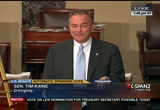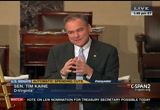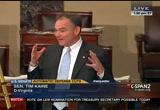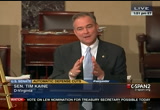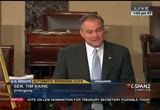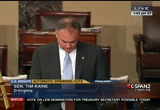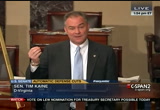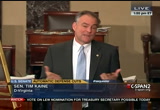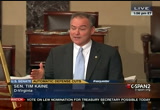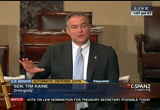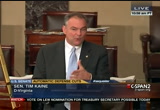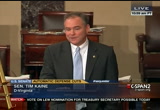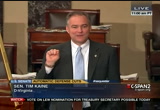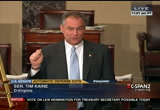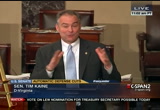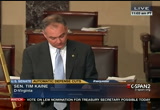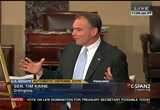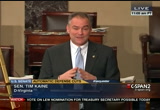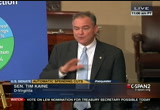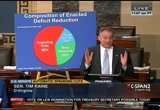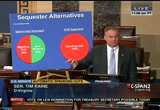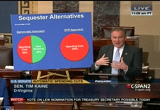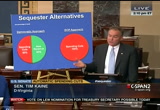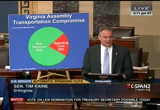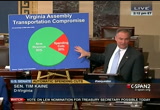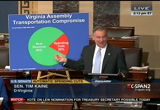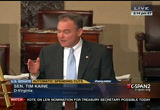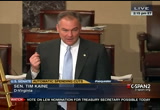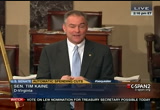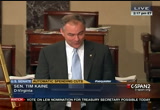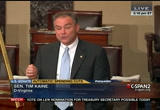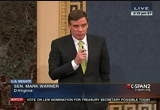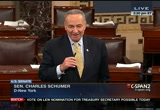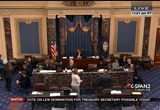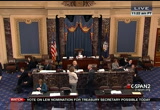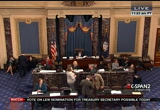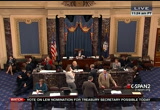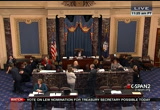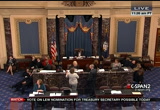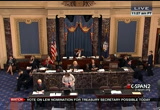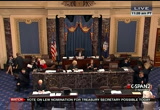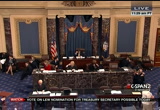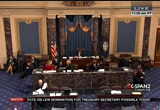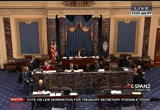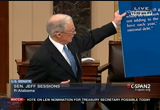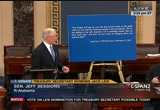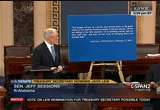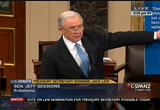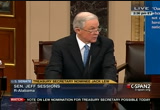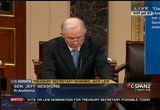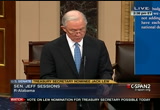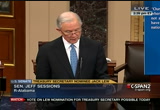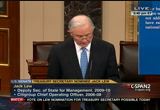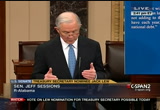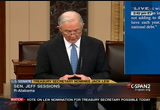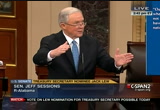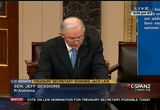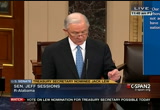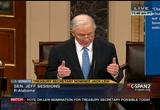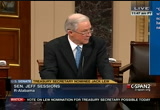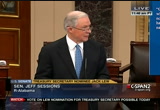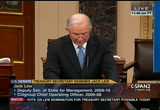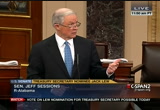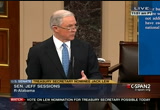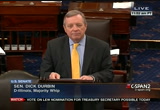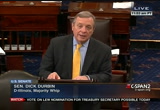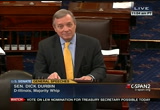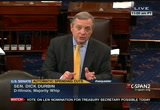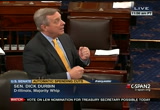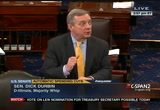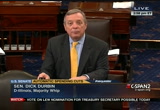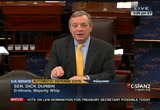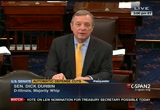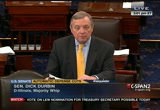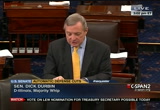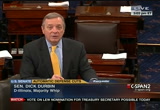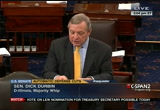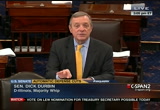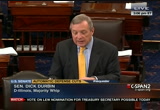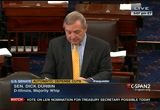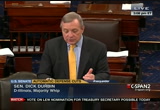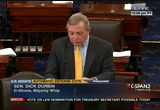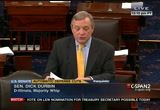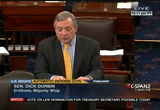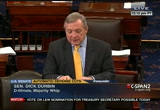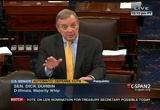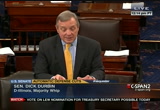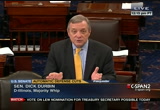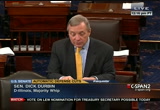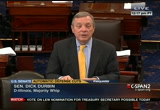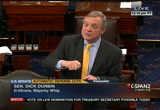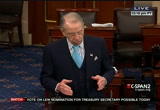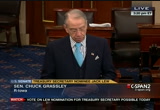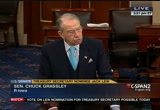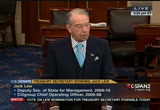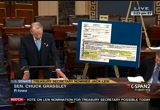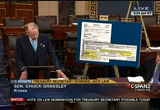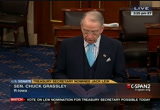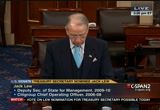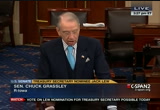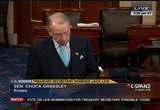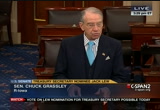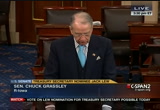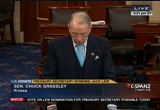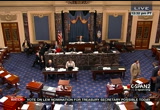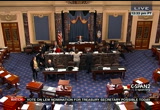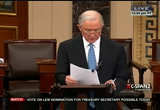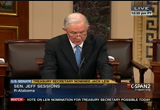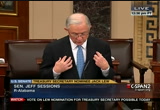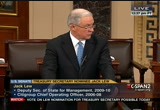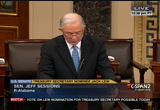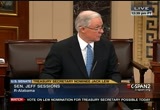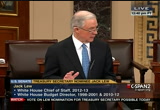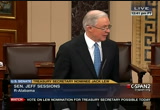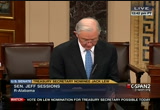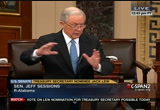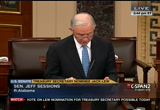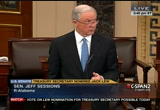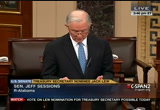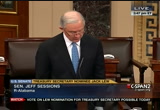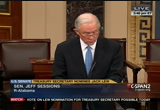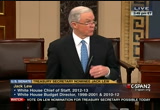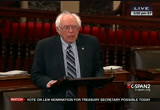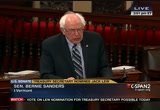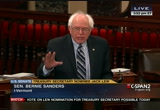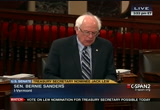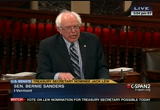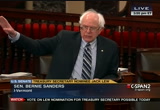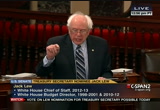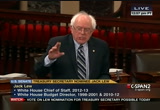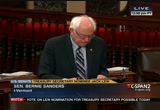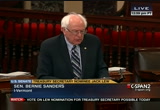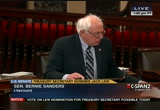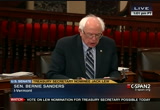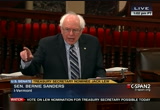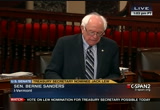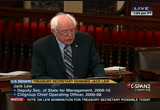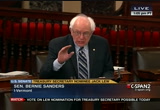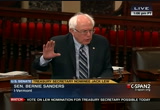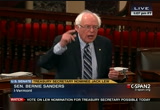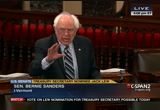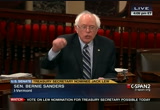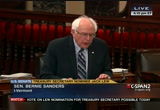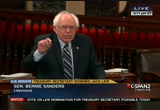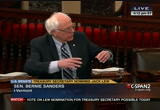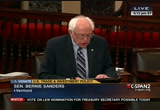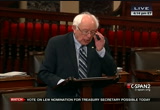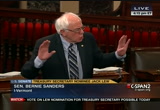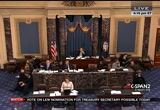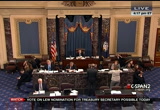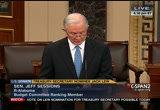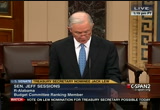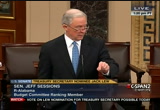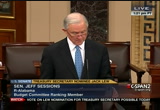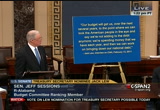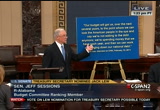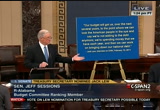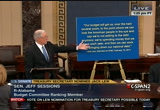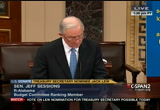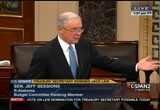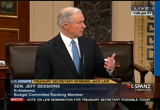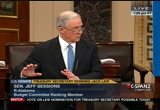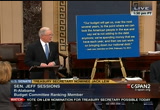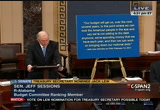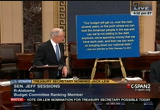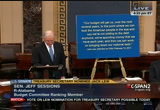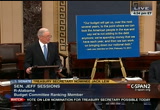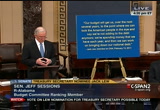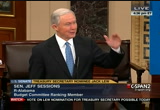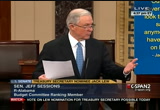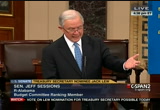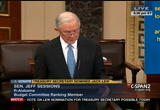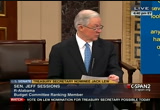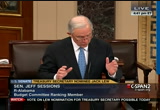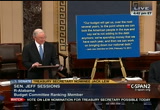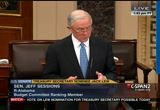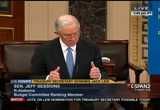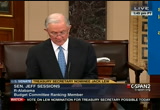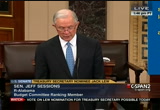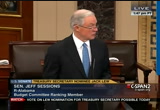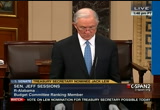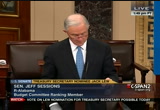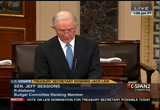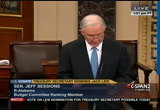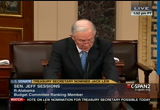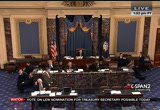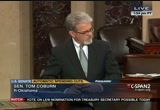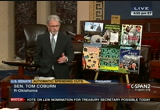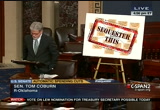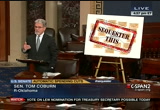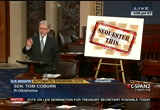tv U.S. Senate CSPAN February 27, 2013 12:00pm-5:00pm EST
12:17 pm
mr. sessions: madam president. the presiding officer: the senator from alabama. mr. sessions: i've made it clear i oppose the nomination of jack lew to the serious position of secretary of the treasury. the president's cabinet nominees should be given substantial deference, that is not in doubt. but our constitution -- makes clear that appointments to high government office may only be made by and with the advice and consent of the senate. so the senate is not a rubber stamp or a potted plant. a decent respect for the seriousness of this occasion for my colleagues and their opinions, for the president and
12:18 pm
for the nominee requires in this case i believe that i set forth my objections to the appointment and they're serious. and when i say i believe it's important, important for the institution of the senate and important for our country. i don't have a personal relationship or extended meetings with mr. lew. my objections arise primarily and first from his performance as director of the office of management and budget. it is in many ways a key position in our government. that is the office through which the president controls all the departments and agencies of our government, which he is required to supervise. normally, and necessarily, the o.m.b. director is a single office that drives efficiency and demands accountable on behalf of the president and the
12:19 pm
american people throughout our great bureaucracy. in that aspect of his job, i've seen little leadership, and at this time of surging debt i would rate that performance as an f. i have never seen a consistent, determined, effort from the director of office of office of management and budget to make more productive this government of ours. indeed, his primary it effort consistently seems to have been to defend any program under attack, scrutiny, or question, rather than examining vigorously to save every single dollar that can be saved for the taxpayers of the country. if the o.m.b. director won't insist on efficiency and good government, who will? the secretary of the energy pushing failed solyndra programs? is that who who we look to or the g.s.a. leaders who host hot
12:20 pm
tub parties in las vegas? this government of ours has never been more poorly managed. it just has never had for a number of years the serious oversight and management from the top supervisory agencies. congress is not empowered to daily manage the agencies of america. that is the chief executive's job and the primary person in his administration, president obama's administration, charged with this duty is the director of office of management and budget, historically that has been the case. but my concerns go deeper than that. i believe that every public official in this nation owes an absolute loyalty to the united states, to the betterment of this country and its government. and to the institutional processes that lead to the governing of america.
12:21 pm
there can be no doubt that every government official from the president on down is accountable to the institutions of our government and to the people, ultimately, without doubt the direction of o.m.b., the director of o.m.b. has such a duty. he's required to meet that duty with honor, honesty, efficiency, and responsiveness. he serves us. we don't serve him. he serves the american people. the american people send their money to washington and they expect it will be honestly and openly managed, accountable. they have every right to demand high performance from all officials, but particularly the director of the office of office of management and budget. surely there can be no higher duty for such an important official than to periodically report to the people truthfully on the importance affairs of state. specifically, to report the
12:22 pm
financial condition of the nation and to produce a budget plan that will fix it. without doubt, the great challenge of our time is how to confront effectively the unsustainable debt course we're now on. that is clearly the greatest threat to our republic. admiral mullen, the former chairman of the joint chiefs of staff said debt is the greatest threat to our national security. we are heading to a financial crisis if we don't change. all experts have told us that, including the simpson and bowles of the president's debt commission. they said -- quote -- "this nation has never faced a more predictable financial crisis." they jointly gave that statement to us in the budget committee. federal reserve chairman bernanke when cd asked about it he made comment about some of the long, great projections of
12:23 pm
debt out in the future, he said, well, that won't happen. you'll never get there. in effect, he said we would have a crisis before that happens. we are on an unsustainable debt path. and even the current secretary of treasury, secretary geithner, made the same comments about director lew's budget. he acknowledged that that budget left the country on an unsustainable financial path. therefore, the report of the nation's top management official on budget and management and to congress on these issues must be absolutely accurate. it must be true. his budget that he would set forth as director of the budget each year as required by law, the president submits a budget, must put the nation on a sound
12:24 pm
and sustainable course, not keep us on an unsustainable course. and if changes in our operating methods of the country are needed, he should say so and help lead that reform effort. so he is the one who keeps the books, he's the one who must, along with the president, rally the nation as mayors and county commissioners and governors have done all over america to rein in reckless spending and unacceptable debt in their jurisdictions, why is it not happening here, now, at this time of national crisis? in february of 2011, as director of o.m.b., mr. lew produced a budget for the president and he presented it to the people and to the congress. that was february, two years ago. he was a budget director. the budget he prepared utterly
12:25 pm
failed to meet the needs of the nation. it just did. as mr. bowles said right after the budget was announced by mr. lew, he said with great disappointment -- quote -- "the white house budget request -- the white house budget request goes nowhere near where they will have to go to avoid our fiscal nightmare" -- close quote. this is the man president obama appointed to head the debt commission. and he says this budget came nowhere near where they'll have to go to avoid our fiscal nightmare. this budget was a disaster. instead of making our debt problem better, it really made it worse. it taxed more and it spent more. i was shocked and amazed. now, please remember this was
12:26 pm
on february of 2011, not long after the midterm congressional elections in which the american people rose up and shellacked a lot of big spending -- big spenders, and demanded really that we get our financial house in order. the american people were shocked by the explosion of debt and the surge of big government, and they demanded more accountability. they insisted on it. to produce a budget that made things worse would not have been a popular thing to do. present a budget that really changed our debt course not at all was not a popular thing to do. imagine what went on in the white house. i just -- i'm just a member of the senate, i observe these things like all of us. i know and the feeling of the moment and what was happening so the question was, would the president of the united states
12:27 pm
now, after the midterm elections that gave majority to the house of representatives, would at that point a policy, a budget set forth a sound, sustainable path for america that could lead the country out of this fix? and i know they discussed it. surely they did. surely it was the most important issue that they faced. would we back down from spending and investment and taxes, would we opt for a more limited growth in spending in america, or not? well, they made their decision. it's pretty clear two decisions were made. and i don't think this is unfair, to analyze it in this way. first, they decided that despite the election, they would not curtail spending or lay out a plan that would alter the debt course of america, that they would not fix and save
12:28 pm
and strengthen our entitlement programs like social security and they would lie and wait, i guess, for anybody in the house of representatives particularly and criticize their plan. they would not lay out any plan in their budget, which is the time you would normally lay out your plan, and they would set up a method to attack the republicans when they produced their budget as required by law, and their budget would have to deal with these things, and propose real cuts in spending, and they would criticize that. apparently that's the decision that they made. but this presented a problem. to announce a budget that did not do what the public had just demanded, control spending and control debt, would not be popular. you wouldn't be popular. so what do you do then?
12:29 pm
it's pretty clear to me how the conundrum was decided. mr. lew would go before the american people and congress and just declare that the budget he had put forth did put the nation on a sound financial course, that it would end the deficits and put us in a position to pay down our debt. he just decided -- they just decided that mr. lew would go out, despite what was in the budget, and declare that it would do those things. thus, these statements of mr. lew amounted to what i have called and will explain, the greatest financial misrepresentation concerning the finances of this nation ever made. and if somebody's got a -- something different, i'd like to see it. i'd like to see somebody say when this -- when we finish talking about this, that they have other examples of this kind
12:30 pm
of misrepresentation. these statements were made carefully and deliberately, calculatedly, and for the political purpose, i have to say, of misleading the public. you may say surely not, jeff. you're exaggerating this situation. surely, he wouldn't do that. let me tell you what happened. a day before the budget was to be released on a monday, mr. lew went on the sunday news programs. to report on the budget that the president would be submitting and explain what was in it. this is what he said on cnn that sunday. now, i will put this up because the words should live in infamy. this is how he described the budget that he laid out.
12:31 pm
quote -- "our budget will get us, over the next several years, to the point where we can look the american people in the eye and say we're not adding to the debt anymore. we're spending money that we have each year, and then we can work on bringing down our national debt." that is exactly what the american people wanted. that's exactly what they wanted to hear. there was no qualification in that language, none whatsoever. he was speaking directly to the american people on the most looked at news programs i guess of the week, the sunday morning news programs. he said similar things on several of the other programs that he participated in february february 12, 2001. no qualifications. how could it be heard otherwise
12:32 pm
than those plain words would suggest, that we had a plan, that the president had a plan, that mr. lew was producing a budget his office produced that would make sure that we were on the right course, a sustainable financial course, we wouldn't be adding to the debt anymore. we're not adding to the debt anymore. what else did that suggest, madam president? it suggested we could just relax. we didn't need to talk about real spending reductions. we had a plan. just follow the president's plan. everything is going to be okay. relax. don't get too excited like you did in this last election. we have got everything under control. our plan fixes it. now, that's essentially what happened. but the budget documents that mr. lew submitted, and the budget documents are this thick
12:33 pm
there, his documents, come out of the office of management and budget, that lay out the financial plan that his budget set. and the question is did his own documents confirm this analysis? did it come close to? well, these documents will reveal the truth in his own -- actually, his documents revealed a rosy scenario of the truth, but the numbers i am going to give you are what his documents revealed, and they have turned out to be less positive even than they predicted. in his own accounting tables, mr. lew's ten-year budget got nowhere close to the point where we could say we're not adding to the debt anymore. or in a position to pay down the debt. to anybody that has the slightest concern for the meaning of words or who believes in the most basic concept of an objective truth, this statement
12:34 pm
must be condemned. even though the lew budget documents made calculations more favorable than the rosy projections than -- than c.b.o., it still unequivocally showed that over the ten-year budget window, there was never a year, not one, ever, when we would be able to pay down the debt or have a balanced budget or not add more debt. indeed, over the ten-year period that his budget covered, that he was referring to in this document, we would add $13 trillion to the total debt of the united states, almost doubling it. $9 trillion to the public debt, $13 trillion to the gross debt. those are different calculations. the public debt is a little smaller.
12:35 pm
the year with the single lowest deficit out of ten was $600 billion in debt. in other words, the lowest single annual deficit in ten years was $600 billion. president bush's highest deficit he ever had was less than $500 billion in eight years. this was huge debt, $600 billion, but it would average almost a trillion dollars a year, a thousand billion a year on average, leaving us clearly on the same unsustainable path we had been on. then on tuesday, mr. lew appeared before the budget committee. i'm ranking republican on the budget committee. i was amazed at what he was saying on television. our scrambling around, looking
12:36 pm
at the documents, it became clear that this wasn't close to correct. how could the budget director of the united states of america go on national tv and make these kind of statements? if we have any expectation of truth in washington that the budget director is going to tell us we're on a sound path when it didn't appear that it were so. and indeed, it wasn't so. so he came before, and i quoted this cnn statement to him. i read it back to him. and directly asked whether his statement was accurate. and this is what he replied -- "it's an accurate statement that our current spending will not be increasing the debt. we have stopped spending money we don't have, "he added. further let me note that outside
12:37 pm
the ten-year window, based on the financial plan that that budget set forth, the deficits got worse. they were going up in the out years. the lowest year was 600, but they were going up every single year, by his own accounting, and c.b.o.'s numbers were much higher in the debt that would be added to the country. so this was just to me a most stunning development. and i don't think it could be explained away. it was obvious he determined he was going to stand pat, stand with his story which was a political narrative that they wanted to spend. they wanted -- wanted to spin. they wanted to spin a political narrative, but it wasn't accurate. that's important for us, that the chief budget person in america needs to tell the american people and the budget committee of the united states senate the absolute truth about the financial condition of this
12:38 pm
country. he is not entitled to sugarcoat it, and he is absolutely not entitled to totally misrepresent it. so i examined him, well, he said there is a deal, there is a primary debt. we're going to have a primary deficit. so what is this, primary deficit? well, you don't count interest. i kid you not, the budget director of the united states of america said this statement in effect as i interpreted it was not inaccurate because he was not counting the interest on the debt. did he qualify that when he told the american people that? no, he did not. did he make any kind of representation to that fact? no. and i would suggest that the numbers clearly show even if you have that kind of bogus accounting where you don't count your interest, who could
12:39 pm
possibly write a household budget, a city budget, a state budget that didn't account for the interest you have to pay every year? how ridiculous is that? that's the kind of phony, gimmicky accounting that makes -- puts this country on a path to financial crisis. that's what he said, but even then by that definition, it was not true, and this would not be true, and it's false. well, well, phony accounting procedures, these budget manipulations and gimmicks like this primary balance idea is the way politicians have maneuvered us into a situation that our path is so dangerous. the american people are not happy about it. they should not be happy. there is no reason we have
12:40 pm
placed this country at such risk because of debt and spending, no reason that we should do that. they sent us here to this congress for a lot of reasons, but the primary reason really is to probably manage their money, manage their program. and so, madam president, i see my colleague from vermont and i think we may get there a different way, but i think we may share some of the same views about this nomination, and i respect his independence and gumption, as we would say in alabama, to express his views openly and directly. but i would just -- i would just say that i'll talk some more because this is an important matter and i don't intend to let it go lightly because i believe this congress and the american people are entitled to honest, sober, serious commentary and
12:41 pm
information from our leaders and we're not getting it. and it makes it hard to get the american people together to figure out how to tighten our belts and how to handle the financial crisis we're in if we have got top officials saying we don't have a crisis, don't worry about it, we have a plan that fixing it. i know that, i don't see any reasons to extend for a longer period of time the lew nomination. he's come out of committee. he had bipartisan support, and he's going to be in a position to be confirmed. but i'm not going to vote for him. i would like to talk some more about some additional problems we have with his nomination, and we'll do so later. i believe it's my responsibility to do so and i intend to fulfill it. i thank the chair and would yield the floor. mr. sanders: madam president?
12:42 pm
the presiding officer: the senator from vermont. mr. sanders: i would say to my friend from alabama, he is right. i also am going to oppose the lew nomination, but for very different reasons than he is, and i will be speaking later on that issue, but from my perspective, at a time when the middle class is disappearing, when we have 46 million people living in poverty, when we have the most unequal distribution of wealth and income since the great depression, we need a secretary of treasury who is going to stand up for working families, be prepared to take on wall street, be prepared to change our disastrous trade policies, be prepared to defend social security and medicare and medicaid and the safety nets so important to tens of millions of americans, that's my objection to mr. lew. and i agree with my friend from alabama, deficit reduction is a serious issue, but where we
12:43 pm
disagree, i don't believe you balance the budget on the backs of the elderly, the children, the sick and the poor. i would ask my friend from alabama, take a look at the cayman islands, take a look at bermuda, take a look at all of the corporations that make record-breaking profits that are stashing their money in the cayman islands for what purpose? to avoid paying taxes to the united states government. you and i have met with the parents of young people, young men and women who have died in iraq and afghanistan. that's called patriotism. it is not called patriotism to run to the cayman islands to avoid paying your fair share of taxes. mr. sessions: madam president, would the senator yield? mr. sanders: i would. mr. sessions: i think -- i would say to you that with regard to our views, i am concerned that working americans are not being fairly recompensed for their work in america today. we have got a long time of no
12:44 pm
real net improvement in the incomes. inflation has been higher than wages. wall street is doing fine. they win, it seems like, whether things go up or down. i don't have any brief for that crowd. i think you're right to be skeptical of how things are handled on wall street, and i salute you for being aggressive in pursuing it. mr. sanders: i thank my friend from alabama very much, and i home we can work together. with that, i would yield the floor. thank you. the presiding officer: republican whip. mr. cornyn: madam president, i come to the floor today to mark another lamentable milestone in the long record of missed deadlines and negligent governing. you might call it malpractice over the last four years.
12:45 pm
as you can see, today is the 1,400th day that our colleagues across the aisle who control the agenda on the floor of the senate through the majority leader have failed to produce a budget or even bring one to the floor so we could vote on one. for 1,400 days this body has been truant from one of the most fundamental obligations of the american people --, to the american people. one when they look to see what's happening here in washington, d.c. they just find they're incredulous. no family, no small business, no local government, no state government, no one except for the federal government could actually operate without a budget. but for nearly four years the democratic leadership of the senate has failed to put forward a fiscal plan to break our economy free from the lingering effects of the great recession. and the evidence or the
12:46 pm
consequences of that are pretty clear. when you look at trillion-dollar annual deficits, when you look at $16.5 trillion of debt, which is threatened our economic recovery and job creation, that is the bitter fruit sown from the negligence in failing to produce a budget for 1,400 days. now, i realize none of that is maybe as easy as it looks and i know our democratic colleagues have been under constant pressure from the white house. indeed, the white house itself has long reinterpreted the role of its annual budget submissions to congress from the governing governments that they once were to now more than really -- no more than political posturing. and as evidence of that i would point to the fact the president's last budget that he submitted got zero votes out of
12:47 pm
99 senators voting. no member even of the president's own political party would support his budget proposal last time because they believed that it was just not a governing doft that -- document that they could support instead of a political statement. these are some of the reasons i can't vote for jack lew for treasury secretary. after all, it was on his watch that most of this happened. in my office and also in the hearing before the senate finance committee, i'm also deeply troubled by the fact that mr. lew would not commit to any limit, to any limit on federal spending. you know, tradition llly over the last 40 years or so the federal government has spent roughly 20% of our gross domestic product. it's been as high as 25% under the obama administration. when i asked mr. lew what's the right figure we ought to be shooting for, he wouldn't even mention any figure.
12:48 pm
so he would not commit to any limit on federal government spending. and he also would not commit to the -- to the administration complying with federal law requiring it to submit a blueprint for reforming medicare known as the medicare trigger, there's a complex formula but if medicare is in trouble, federal law requires the administration to submit a plan to fix it. mr. lew said we didn't do it and we're not going to do it. i can't support a nominee who refuses to commit to tackling one of the biggest drivers of our debt on the eve of another manufactured fiscal showdown that was actually the president's and the white house's idea, this sequester that people are hearing so much about, which is now being used
12:49 pm
as a means to which to extract from the american taxpayer more money. so instead of the -- instead of the federal government doing what every family and every business has to do when there's not enough money coming in the door, the white house and the democratic leadership are insisting on more from hard-working americans. after a $600 billion tax increase in just december. unfortunately, it's hardly surprising that president obama would nominate someone who cannot simply commit to following the law. this administration has a record, sadly, of flouting the law of the land. and i'll give you some examples. this administration of which mr. lew has been an essential member has, for example, during the government run automobile bankruptcy process, the
12:50 pm
companies secured creditors who were supposed to get paid first found they were given less than unions were because of politics and flouting the rule of law. and we know as sinned a because -- solyndra was going bankrupt, the administration decided rather than to let the private lenders pay for their bad judgment, decided to make taxpayers subordinate to those private lenders. and last year we know because the circuit court of appeals in the district of columbia has told us so, the president made an unconstitutional appointments to the national labor relations board and to the now the consumer financial protection bureau. that indicates hasn't been decided but it's impossible for me to see that there's rationale would be any different than the court of appeals decision in the nlrb case.
12:51 pm
we know also that last year the president waived key requirements of the 1996 welfare reform law and to help implement obamacare, the internal revenue service has announced it will violate the letter of the law and dispense health insurance sub disthrough federal exchanges in those states that do not create state obeyed exchanges. then we know when the 2,700 page behemoth known as obamacare began to be implemented that when some of the supporters and some of the president's own supporters complained about it, they were issued waivers, even though the rest of the american people had to simply take it. and finally, the president has missed, again, the legal deadline for submitting his own budget for this year. that was on february 4. in fact, four of the last five budgets have been late.
12:52 pm
simply put, we can't keep living like this. we can't allow this to become a precedent for future presidents and future majorities regardless of party to rely on. we can do better. we must do better. and my 26 million constituents in the state of texas demand that we do do better. i yield the floor and i'd suggest the absence of a quorum. the presiding officer: the clerk will call the roll. quorum call:
12:54 pm
a senator: madam president? the presiding officer: the senator from alabama. mr. sessions: madam president, just to follow up further on the situation we faced --. the presiding officer: the senate is in a quorum call. mr. sessions: i would ask that the qerl be dispensed with. the presiding officer: without objection. the senator from alabama. mr. sessions: i thank the chair. madam president, so i talked about the critical importance of having honest numbers, and we can disagree on certain numbers.
12:55 pm
mr. lew predicted that under his budget the deficit last year's deficit, in the tenth year would be about $800 billion, congressional budget office taking his same numbers, same analysis, said it would be 50% higher, said it would be $1.2 trillion. he was using rosy scenarios. the nonpartisan congressional budget office came out with less -- lower or greater debt numbers, and more danger for america. i'm not so much complaining about that, although i think they deliberately tried to make their numbers look rosy. what i'm complaining about is a fundamental mischaracterization of the budget that he presented and what it would do according to his own analysis contained in the budget documents he submitted with his budget. and this is a really important matter. people say why don't you get together in congress?
12:56 pm
why don't you all reach an agreement? well, it's kind of hard to reach an agreement when the lead negotiator for the president, mr. lew, some call dr. no, goes around saying that we don't need to do anything. our budget that we submitted will get us over the next several years, to the point where we can look the american people in the eye and say, we're not adding to the debt anymore, we're spending money that we have each year, and then we can work on bringing down our debt" -- close quote. bringing down our total debt because we're going to have surpluses, enough money to pay down the debt. where according to his own numbers, the lowest deficit he had was over $600 billion, and they were going upwards the last
12:57 pm
six years. getting worse. and the congressional budget office said that the last deficit would be 1,200 billion dollars. unbelievable. so i want to continue to discuss that. according to the budget numbers that he put out, his plan would add $13 trillion in new gross debt to the united states in ten years, by 2021. that was in 2011. single-year deficits will never drop below $600 billion. and 2015 they would start climbing back up to $774 billion. over the ten years, total spending would increase -- not be reduced at all, of course, -- but increased by nearly 50% with mandatory spending alone not in any way controlled or reformed or fixed by the lew budget.
12:58 pm
mandatory spending would increase by more than 80%. and mandatory spending makes up more than half of all the spending in our government. on track by his own budget, by his own projections, by what he believes should have happen, increased 80%. in fact, entitlements are growing about three times the rate of g.d.p. growth, the rate of the growth in the economy. that's unsustainable. we -- you ever hear that from the president or his chief budget guy, mr. lew, who is now expecting to be the secretary of treasury, the primary. , premier economic leader for america. if you can't be honest about the situation you're in, you ought not to be promoted. that's the way i feel about it. i feel strongly about it.
12:59 pm
i've never seen anything like that in my entire time in the united states senate. to have this kind of statement made that is so utterly unconnected to reality. now, it wasn't long after mr. lew came -- he came to the committee two days or three days after this statement, i asked him about that, asked him if that was accurate. and he said -- quote -- "it's an accurate statement of our current spending, that it will not be increasing the debt. he added -- quote -- "we've stopped spending money we don't have." and the lowest deficit, $600 billion? so -- but mr. geithner came after this exchange and i'm sure mr. geithner was well aware of what happened in the budget committee. that mr. lew dug his heels in and insisted this statement was true.
1:00 pm
what did secretary of treasury, mr. geithner, say at that point? and this is a the difference i think in mr. lew and mr. geithner. mr. geithner was former head of the federal reserve in new york, a man of some seriousness and gravitas and he wasn't going to go in there and say something that wasn't true before the budget committee. although he didn't give it up easy. i had to use all the skills i had to pin him down, but when i did, this is what mr. geithner said -- "even if the budget mr. lew put forward were passed and enacted, mr. geithner said -- quote -- " we would still be left with a very large interest burden and unsustainable obligations over time." in effect, he said that we would be left with an unsustainable debt path, when mr. lew said don't worry, my budget fixed it.
1:01 pm
and geithner was talking about this very budget. and writing in "the new york times," writing an article, an op-ed in "the new york times," mr. lew said -- quote -- "the president's budget is a comprehensive and responsible plan that will put us on the path toward fiscal sustainability in the next few years." close quote. he wrote that in "the new york times." totally inaccurate. does he not respect the american people? does he think he can just go and make cnn statements and write i "the new york times" and say anything he pleases about the financial condition of our country, a financial condition that represents the greatest threat to our national security, more than any other threat that we have in this world today? and that same month, mr. lew stated in an interview with
1:02 pm
national public radio that -- quote -- "if we are able to reduce the deficit to the point where we can pay for our spending and invest in the future, that is an enormous accomplishment. this budget has proposals that would do that." close quote. and it did not. the budget didn't have anything in it that would have had us pay for our spending. continuing to borrow. we're borrowing 36 cents out of every dollar we spend this very day. we're adding debt to our nation every single hour. to say that we're going to be paying down the debt. now, at no point did mr. lew's own estimate show that the
1:03 pm
president's 2012 budget coming close to a point where we could pay for our spending, excluding interest payments on the national debt, excluding the interest, the plan would have resulted in $1.5 trillion in deficits over ten years. and even more than that, when you consider the full interest cost of $7.2 trillion. the long-term outlook with annual interest payments approaching $1 trillion in mandatory spending consuming over 3/4 of the budget after ten years and growing entitlements and mandatory spending absorbing 3/4 of the budgets, mr. lew's comments were not merely misleading but i believe qualify to be described as the greatest financial misrepresentation in the history of the american republic.
1:04 pm
if someone's got a better analysis of it, i'd like to hear it. if somebody comes down and says this is a true statement, i'd like to hear him say it. i invite all my colleagues, members of the finance committee, lots of them voted for mr. lew, do you think it's okay to say this? do you think this is accurate? if it's not accurate, do you just want to promote him anyway? why would you want to do that? i don't understand it. i'm not going to support that. and mr. lew made these representations over and over again, and the president's next year's budget in 2012 for the 2013 fiscal year was formulated while mr. lew was still the president's budget director and delivered while he was the president's chief of staff, it similarly was extreme and irresponsible, and it was part of a continued campaign to
1:05 pm
mislead the american people about how it operated, to say it was so much better than it really was. although the white house claimed $4 trillion in savings, according to the office of management and budget's own data, the 2013 budget would only have reduced the deficit by $1,197,000,000,000 over ten years. they claim they saved 4 trillion, $4 trillion, but in fact it would have only reduced the budget by $197 billion over ten years, virtually not changing the debt course of america. and all of those savings, virtually every one, were from tax increases. the spending was not reduced. the white house also pushed the idea that the budget contained contained $2.50 in budget cuts
1:06 pm
for every one dollar in tax hikes, while in reality there was a net spending increase above the policy baseline that we were operating under. it spent more, not less. gee, and they claim to have have $2.50 in cuts for every one dollar in tax hikes. that's just not true. overall the current budget level spending would have increased more than $2 trillion. the net result of the proposals contained in the 2013 budget was to bring the federal debt up to $26 trillion by 2022, an increase of $11 trillion. the proposed $4 trillion in savings simply did not exist. it was a complete fabrication. mr. lew understood that. he helped write that budget. he was chief of staff at the
1:07 pm
white house when it actually came to the senate. once again, a lew-designed budget was presented to the american people in false terms designed to create the impression that we were putting america on a sound financial path while we were doing the opposite if it had passed, and of course you say well, sessions, that's your beef. you're the one that's mischaracterizing the president's budget. this is all partisan. maybe you would think that. i hope not, but that's what some of the other observers around the country said about it when it was released. i am now talking about the budget that was described by mr. lew in these wonderful terms. if we had a budget that would do that, american people would jump up and down and shout hallelujah. we're not close to it, however, as independent observers
1:08 pm
noticed. look what these honest observers said about it. "washington post," the largest paper here in washington -- quote -- "the larger problem with the budget is the administration's refusal to confront the hard choices that mr. obama is so fond of saying must be faced." close quote. the title of that editorial was president obama's budget kicks the hard choices further down the road. what about "usa today"? a nationwide paper. quote -- "president obama likes to talk about those sputnik moments when a nation rises to difficult challenges like the ones proposed by the soviet space program in the 1950's. on monday, the day this budget was releaseed -- quote on
1:09 pm
monday, he had a chance to turn his budget proposal into his own such moment. he whiffed." close quote. the title of that editorial -- "obama's budget duff ducks tough choices." what about the "financial times"? president obama has unveiled a hugely disappointing budget, cutting only a few percentage points in the projected u.s. federal deficits over the remainder of this century. if mr. obama will not make his case, who will? the title of that budget -- that editorial -- "obama's budget shows failure of leadership." that is absolutely true, it was a failure of leadership. what about "the washington post" writing on a little further --
1:10 pm
quote -- "white house budget director jacob j. lew has told advocates of reform that the white house thinks any significant plan offered by the president would simply become a target for a partisan attack." then he goes on to quote alice rivlin, saying -- quote -- "i would have preferred to see the administration get out front on addressing the entitlements and the tax reform that we need to reduce long-run deficits," said alice rivlin, a commission member on the deficit commission who served as budget director in the clinton white house. that's what alice rivlin, a wise commentator. a democrat but a wise commentator. but -- and she went on to say -- quote -- "but they clearly made a tactical decision." she meant a political decision. "the washington post" title of
1:11 pm
that was "obama's spending plan criticized for avoiding the commission's measure proposals." what about "the washington post" -- quote -- "erskine bowles, democratic chairman of the fiscal commission, said the white house budget request goes nowhere near where they will have to go to resolve our fiscal nightmare." he's referring to this. this was on february 14, two days after mr. lew made those ridiculous statements. this is mr. erskine bowles, a man chosen by president obama to head the fiscal commission and spent a year studying our debt problem. how about "investors business daily," a prominent business publication."
1:12 pm
the white house new budget is far worse than merely bad by not attacking the underlying cause of our debt explosion and by raising taxes, it will lead inevitably to a weaker economy and perhaps even default." close quote. the title of that editorial -- "obama's gutless budget proposal." written by mr. jack lew. what about "the wall street journal"? this is entitled the c-lo green budget." after three years of historic deficit that is have added almost $4.5 trillion to the national debt, president obama was finally going to get serious about fiscal discipline. instead, what landed on congress' doorsteps on monday was a white house budget that
1:13 pm
increases deficits above the spending baseline for the next two years. hosni mubarak was more in touch with reality last thursday night." close quote. "the wall street journal," premier business publication in america. ""orlando sentinel ,"" count us deeply disappointed by the $3.7 trillion budget that president obama revealed monday to tackle the national debt, mr. obama needs to get off the sidelines and start leading." close quote. title of that, "president obama's budget plan falls short ." jack lew's budget plan. "new york daily news", "but the bottom line is that president obama is figuring on reducing the deficit by $1.1 trillion over ten years while his blue ribbon commission said cutting four times that amount is
1:14 pm
critically necessary." close quote. the title of that editorial was deficit of courage. president barack obama rolled out. this is another one, quote president obama rolled out a $3.7 trillion budget that promises $90 billion in reduced spending for fiscal year 2012 but it would still would you a whopping $1.1 trillion deficit. the best that can be said is that we started to frame a national debate, "said the" chicago tribune ." indianapolis star -- quote -- "obama has all but ignored the recommendations of his own deficit reduction commission." close quote. and in the headline of that editorial -- quote -- "we ignore the red menace at our
1:15 pm
peril." how about the los angeles times, a major western newspaper of liberal political views -- "president obama's budget for fiscal year 2012 landed with a thud monday." laying out short and long-term tax and spending plans that disappointed lawmakers on both sides of the aisle, this proposal was a remarkably tame response to washington's fiscal problems, not the bold statement about belt tightening the white house suggested was coming. "the denver post," another large but -- and liberal newspaper. quote, obama called the proposal one of the tough choices and sacrifices, yet it does not confront entitlements
1:16 pm
and continues to act as if government spending is the way to prosperity close quote. that is true, for sure. the san francisco chronicle. in a crucial way, it acts honesty, close quote. an important newspaper. how about the dallas morning news? big newspaper. taken as a whole, his proposals represent the third time in two months he has walked up to the challenge of curbing the deficit and more troubling long-term debt and turned away on leading the nation back from an impending fiscal nightmare. the philadelphia inquirer, the shortcomings in the obama spending proposal is a lack of
1:17 pm
strategy for long-term deficit reduction, close quote. now, that's correct. it had none of that in it. it goes on to say -- quote -- "cutting deficits by $1.1 trillion over a decade might sound significant but the nonpartisan congressional budget office has projected deficits rising $12 billion over that -- trillion dollars over that time ." the title of that editorial, missing -- "still missing the mark." "the minneapolis star tribune." quote, the flurry of deficit reduction plans released last -- late last year were supposed to kick off a national adult conversation about the nation's metastasizing long-term debt problem. so when is that conversation
1:18 pm
going to begin? it certainly didn't happen on monday when president obama released his $3.7 trillion budget request for 2012. the title of that editorial, "slinking away from u.s. budget reality." written by mr. jack lew, the director of the office of management and budget who declared it was a wonderful budget, totally miss representing -- misrepresenting what it would do. "the washington post," dana milbank -- quote -- "obama's budget proposal is a remarkably weak and timid document. the president makes no serious attempt at cutting entitlement programs that threaten to drive the government into insolvency" -- close quote. what about senator kent conrad.
1:19 pm
he was chairman of the budget committee at that time, distinguished democratic senator who has retired from congress and he's not -- he's not -- no longer in the senate. this is what kent conrad said. my friend with whom i served on the committee. quote, "but we need a much more robust package of deficit and deficit reduction over the medium and long term." well, so our democratic leadership in the senate refused to bring up a budget. we've to -- today marks the 1,400th day that this senate has violated the law of the united states and not produced a budget. it's unthinkable, really, at a time when debt represents the
1:20 pm
greatest threat to our country, but the house each year has passed a budget, but you see, that was part of the strategy. that was part of the gimmick. senator reid, the democratic leader said, we don't need a budget, it's foolish to have a budget. that was his comment. foolish to have a budget, even though the law explicitly requires the senate to produce a budget. what did he mean, foolish? he meant if you pass a budget, somebody could criticize you. somebody could look at your spending and taxes and evaluate and say we don't like that. it doesn't fix the debt, or it raises taxes too much, doesn't cut spending or increases spending too much. why do that? it's foolish. let's just don't pass one, and we'll criticize paul ryan, the young, dynamic chairman of the house budget committee, who wrote a budget that passed the house and would have fixed our debt problem, and put us on a
1:21 pm
sustainable course. a budget that was complimented by alice rivlin and erskine bowles. they may not have agreed with everything in it but they complimented it on having integrity and doing what it said, and laying out a plan for the future of america. and the house passed it, but what did the senate do? nada, nothing. one of the greatest acts of irresponsibility, i submit, in senate history. a lot of them out there. this is one of the top group in my opinion. how could you possibly at a time of crisis not bring up the budget? the president submitted a budget, as he's required to do by law and every president always has, but the senate just decided not to even move one. they say we'll have one this year. i'm looking forward to that. it's behind time. so is the president's submission of a budget. he's late, according to the law, in submitting that.
1:22 pm
so as time went on and the tension rose over budget and our future spending program, the democrat leader in the senate thought he would be clever and we bring up senator ryan's budget, make all the republicans vote for it and virtually all did, maybe two or three didn't, and then they would attack them because it had cuts in spending. and we're going to say you don't like old people, you don't like children, you don't like education, you don't like this and health care, and we'll just -- this will be great. and he did that. he just brought it up on the floor. and like i said, most republicans, virtually all voted for it. but senator mcconnell said okay, let's bring up the obama budget. let's bring up the budget jack lew prepared. let's bring it to the floor, and he forced a vote on the lew
1:23 pm
budget. how many votes do you think that got? zero. every democrat voted against it and every republican voted against it. it was brought up in the house of representatives. every democratic member of the house voted against it and every republican voted against it. and it happened the next year, 2013 budget, not a single person voted for this budget. because it wasn't worthy of a single vote. it would not do anything to change the debt course of america, and they were totally misrepresenting what it would do and it was really a sad moment. so that's -- that's where we are. and i just don't -- my question simply would be, where was mr. lew in this? he was the architect of it. he was the architect of the budget, but he was deeply,
1:24 pm
deeply involved in the political activities that were going on at this time. and it fell to his lot -- i'm not sure if he asked for it, to come and testify before the budget committee and go out and say these kind of things about it, these words that will live in infamy, or did he just volunteer to do it? was he so much a part of the obama political interests that he would say whatever it takes to promote a budget that wouldn't work? secretary geithner, president obama's own secretary of treasury, we not say so. he wouldn't say these kind of things. he tried not to embarrass the administration, he tried not to embarrass mr. lew, but when i pinned him down, he said this still leaves us on an unsustainable debt course. not fixing our problem, as was
1:25 pm
represented. so now we want to replace mr. geithner, a man who was frankly -- was frank about the dangers we faced at his testimony, with a man who stood by this kind of testimony and statements. i do believe that our country is a bit confused. i believe that we've gotten to the point where in politics people think they can say almost anything and nobody cares. you just say this or say that, and if it's not true, well, so what? i guess that's just politics. but if we continue in that way, this is a very dangerous trend, very dangerous. it places the entire democratic republic of america at risk.
1:26 pm
the whole concept of american government is based on finding the truth. that's why you have debate in the senate, open, public debate, and the truth that -- the theory is somehow, will somehow rise to the top and normally it will when you have honest great debate. you have negotiations and you can begin to reach a consensus sometimes, at least, but how can you reach consensus when the person you're negotiating with is insisting that his budget does things it absolutely does not do? and he's doing that for political reasons, really, not for the interest of america. how can you deal with that? so i think this senate as a matter of its own integrity to defend the integrity of the united states senate, and perhaps more importantly, to defend the integrity of the
1:27 pm
american people, has a firm and clear duty to insist that high public officials tell the truth when they come before congress o'or when they go on national television. he's being paid by the american people. was he paid to misrepresent the budget or tell the truth about the budget? if he doesn't tell the truth about the budget, is there a consequence? we just promote him up to some other high office because he helped the president win his election, by spinning the debt situation in america in a way that's not correct? and make no mistake. i believe -- i don't have proof of this, maybe it's wrong, but it seems to me this was a campaign decision made in early 2011 that they were going to say that their budget fixed our debt
1:28 pm
problems. so why do i say that? because it was continued periodically off and on and was repeated again in a national television ad by the president of the united states in september of last year, september of 2012, to win reelection. our plan pays down the debt, i believe was the phrase they used in that television ad. that wasn't true. he didn't have a plan that paid down the debt or didn't add to the debt, put us in a position to pay down the debt. never had a plan to do that. he just didn't. so you say that's not correct. so i'll ask my democratic colleagues, it's a free country, free senate, you come down and say if i'm incorrect on this. show me where i'm wrong. if i'm wrong, i'll apologize. but i don't think i'm wrong. because i've looked at it hard
1:29 pm
1:35 pm
a senator: mr. president? the presiding officer: the senator from alabama. mr. sessions: i would ask consent that the quorum call be dispensed with. the presiding officer: without objection. mr. sessions: madam president, the lew nomination is not received enthusiastic -- has not received enthusiastic response in many quarters, that's for sure. maybe the hard left where he has been an advocate of some very hard left views and inflexibility when it comes to dealing with some of our entitlement programs and welfare programs that have been surging
1:36 pm
out of control, but this is what some others have said about the nomination. larry cudlow, the commentator on cnbc, was an economist for the federal reserve system of the united states and a former chief economist at bear stearns and an employee at the office of management and budget. he was a chief economist there. this is what he said on the radio not too long ago. i guess this was written by jeff poor, reporter for "the daily caller." i just quoted mr. cudlow. he explained why president obama's nomination of jack lew as timothy geithner's replacement to head the treasury department was a -- quote -- "nutty appointment." if you keep up with business issues and stuff, you'll see mr. cudlow on the tv regularly, and he, like a lot of our
1:37 pm
commentators, enjoys stirring the pot sometimes, but as i said, he was a chief economist at bear stearns and at the office of management and budget and an economist at the federal reserve. he knows a great deal about the economy. he called this a nutty appointment. mr. cudlow pointed out, pointed to lew as the problem as why we don't have a budget. he said he is part of the problem. he cited lew's lack of qualifications as another reason that president obama's appointment was -- quote -- "completely irresponsible." close quote. mr. cudlow went on to say this -- "you know, this whole thing is kind of centered around the senate which hasn't done a
1:38 pm
budget in 1,351 days. today is the 1,400th day, i would add. i continue to quote mr. cudlow -- "so whatever that is, four years. quote, now the white house might not even submit a budget and now the white house had taken the budget director and chief of staff and put him over at treasury." talk about the budget director who hasn't written a budget in four years and his chief of staff and sent him to be secretary of the treasury. quote -- "where jack lew is completely and i mean completely unqualified to be treasury secretary." close quote. mr. cudlow goes on to explain -- quote -- "he has no financial experience, he has no international experience, he has no currency experience, he ripped off citibank for a couple of million dollars.
1:39 pm
he was there for one year. i mean, there is about a million people, give me a phone book and you will find somebody more qualified for treasury secretary than former o.m.b. director jack lew. this is all of a piece. it's completely irresponsible." close quote. well, that's pretty clear what he expects there. what he believes. but i think that's a valuable insight. are we just making this up, this staffer for tip o'neill and the staffer for the budget o.m.b. before and now chief of staff at the white house, is he really qualified to lead the united states of america in addressing the challenges of our time? what about the secretary of treasury position?
1:40 pm
is that a man of great importance? the treasury, one of the four great cabinet positions we have, attorney general, defense secretary, treasurer. credibility of treasury secretary is his greatest asset. as i said, this statement raises the most grievous doubts about his credibility, and we have had great secretaries. early on a swiss emigrant helped create the white house ways and means committee. salmon chase from ohio, served as one of lincoln's top aides and was responsible for the system of federally chartered banks. william mcadoo, a distinguished businessman who helped create the federal reserve system. andrew mellon, brilliant
1:41 pm
businessman who served as secretary of treasury. henry morganthal jr. who served as f.d.r.'s treasury secretary from 1934-1945. william simon, successful businessman who served as secretary under nixon and ford. he supervised the nation's economic policies in crisis times. so this is not what we -- he doesn't have the kind of background you would normally look for in a secretary of treasury, particularly when we are doing so poorly economically. yes, we had a big recession, but we're coming out of it at a slower rate than we perhaps have ever seen other than the great depression. mr. malvous testified at the budget committee yesterday, said the lew, obama, paul krugman theory of borrowing money and spending money to stimulate the
1:42 pm
economy and get us out of the recession, all you have to do is look at it and see it didn't work. how much more evidence do you need? so that's the advice we have been getting there. so this good quality -- this good staffer quality is what the chairman of the senate finance committee, senator baucus, our democratic chairman of the finance committee, seemed to see in jack lew during his recent confirmation hearings. he seemed to call into question the necessary stature that the position requires, and if jack lew met those standards. this is what senator baucus, the chairman of the committee, said to mr. lew -- quote -- "i'm going to ask you, it's clear you
1:43 pm
would be a great staffer. i'm not talking about being a great courageous staffer and telling the president what you think and don't think. i'm talking about something else. i'm talking about the public perception, the public misdemeanor representing the united states around the world, across the country and around the world to be able to influence policy in a way that makes sense, most of us would tend to grie -- agree with, the policies we would tend to agree with. we may differ along the edges, but most everybody in this room agrees that needs to be done. that's what i am getting at." so even the chairman of the finance committee, democratic chairman, senator baucus certainly raised some questions about the nomination. madam chairman, i appreciate the opportunity to speak. i look forward to senator governor kaine's remarks and i would yield the floor. mr. kaine: madam president? the presiding officer: the senator from virginia. mr. kaine: i ask unanimous
1:44 pm
consent to speak as if in morning business, that the time count against the nomination, and that my remarks be placed in the record at the appropriate place. the presiding officer: without objection. mr. kaine: thank you, madam president. it is an honor to stand here for my first speech on the senate floor. i am honored to be part of this body and to speak where hundreds have spoken before and thousands will speak after me. a normal first speech for a senator is usually a proactive, forward-looking speech. we're not in normal times. a normal first speech for a senator usually happens much later after a senator has been around for a number of months. we're not in normal times. a normal speech -- first speech for a senator is often in connection with the introduction of a piece of legislation. we're not in normal times. and so i am speaking a bit earlier than i would have thought likely when i took the oath of office on january 3, but
1:45 pm
i am speaking in particular because we're not in normal times, and the abnormality of the times has a huge effect on the commonwealth that i'm proud to represent. in the summer of 2011, congress passed a bill that we are now talking about, the bill dealing with the sequestration cuts of the federal government. and there is no precedent that i am aware of in congressional history for what's about to happen in 48 hours. congress designed a set of punishing, nonstrategic, ugly cuts designed to hurt the economy and hurt individuals, and all -- however they voted on that bill, did not want these cuts come into play. so those who voted for it in 2011 did not want the sequester cuts to occur, and believed we would find through compromise an alternative and those who voted
1:46 pm
against the package in the summer of 2011 largely voted against it because they did not want these cuts to occur. and so the abnormality of the times is this: never in my knowledge in the history of this body has congress designed a punishment that would hurt the lives of regular individuals, that would hurt the economy. it was designed with that knowledge fully, all hoped it would not happen and yet we're in 48 hours of allowing it to happen. and the effects that this sequester will have on the country and the effects that it will some have on my commonwealth are so significant and severe that i do feel compelled to speak a little earlier than i otherwise might have. and i would also add that i think the effects of the cuts on this institution and on the credibility of the institution are equally severe. what i want to do in this speech is do a couple of things. i want to talk about the effect
1:47 pm
of these sequester cuts if they happen on regular people. i just returned from a tour around my state and i'm going to share some stories. i want talk with some data about short-term impacts of these cuts on the broader economy. third, i want talk about some long-term impacts, some impacts that we're not necessarily thinking of right now but should cause us some significant concern. fourth, there's a way to avoid this, and i want to talk about how we can avoid allowing this self-inflicted wound to occur. and finally, i want to talk about the fact that there's an up side in this moment for us. this is not just about avoiding negatives, avoiding harming people, hurting the economy. it's not just about avoiding negatives. i think there's an upside for us and for this institution and for this nation if we do this right. so let me begin with my tour around virginia. i'm now a brand-new member of the armed services committee and
1:48 pm
i -- i sit in a wonderful seat following a john warren who was -- warner who was there and jim webb and i'm no replacements plaiment for of those individuals but i have big shoes to fill. so i decided to take a tour around my state last week and visit the various touch points in the commonwealth where we interact with our military and our national security. the map of virginia is a map of the military history of this country. yorktown, where the revolutionary war ended, an poe matter,to where the civil war ended, the pentagon where we were attacked on 9/11. we are the most connected, one in eight virgin islands is a veteran. not one in eight adults, but from birth to death. over 100,000 active duty, guard and reserve, d.o.d. civilians, d.o.d. contractors. by the time you add all those up and their families, military families we're probably talking about one in three virginians. so i went to the places where
1:49 pm
virginians work every day, as ship repairs and private shipyards, active duty on naval bases, as d.o.d. civilians working as nurseness army hospitals, as young officer candidates training in rotc programs, at v.a. hospitals. i went around the state and let me tell you what i heard. a few miles from here, fort belvoir, one of the preeminent institutions that treats wounded warriors. a wounded warrior still on active service being treated there, wife sitting right next to him, we talked and she ventured this, let's talk about these furloughs of these d.o.d. civilian employees. my -- my husband's nurses are all d.o.d. civilians. and while the sequester protects active duty, it doesn't protect the civilians, what's it going to mean to my husband's medical treatment as he comes back from being wounded, injuring this nation if the nurses and health professionals at this hospital are furloughed one day a week?
1:50 pm
in the same roundtable, another wounded warrior said to me, boy, the economy is really going to suffer if's wee have the sequester. we're going to lose jobs and the economy could shrink. i'm a reservist. he was a wounded warrior as a reservist waiting to go back into the civilian work force into a job with a federal agency that does national security. what's that going to mean to me, is there a hiring freeze, a pay freeze, is there a furl oath, this wounded warrior was worrying about his economic future. in newport news, what a good news story. we virginians, we manufacture the largest items that are manufactured on the planet earth, nuclear aircraft carriers, in that shipyard. what a wonderful american example of ingenuity that is and yet in looking at these sequester cuts, as repairs and other projects and programs are being scaled back, the workers at that shipyard are asking
1:51 pm
about the stability of their work and about whether the ships that we put out and we put our people on will be truly ready to do the work they need to do. at other private shipyards, the owner, a small business guy who has a shipyard in hampton roads said i have 450 employees, the way the navy plans to deal with sequestration is to dramatically reduce maintenance in the third and fourth quarters of the year. i am going to issue one notice to tell 300 of my 450 employees they will not have a job. i don't see how i can run this business without them but i don't have the business to keep them if the sequestration cuts go through. at a v.a. hospital in richmond, the v.a. core services are protected under the sequester, but they're under hiring freezes. they compete with private sector hospitals to hire nurses and physicians and they say that's getting tougher and tougher to do. and they do research in richmond about traumatic brain injury and
1:52 pm
that research money is not protected from sequester, and so this research that will help us treat our wounded warriors better, that's in jeopardy if the sequester goes through. and it's not just military cuss cuts, in head start i talked to teachers who were facing significant cuts in programs for at-risk kids even at a time because of the economy the number of at-risk children is growing and growing and the number of children total in their classrooms is growing and growing. and then monday a number of us were at dulles airport to talk about the effect of sequester on something that's, you know, fairly basic, the experience of the americans by the millions and millions who travel every day in the air, longer lines, potentially higher prices. this is what virginians were telling me as i went to talk to them about what we were doing in washington, the -- the likely consequences that they were going to see in their lives. and again and again what they said to me was go up and find a
1:53 pm
solution. i went to a bluegrass concert on saturday afternoon and i was wearing blue jeans and a carhart jacket, i sat next to a guy who appeared 80 years old, ramrod straight, energetic fan, a veteran wearing a cap from his navy service, and about halfway through the set he leaned over and he said now i know you're here for music. you didn't come to politics. i said that's right. he said all i'm going to say is this, there's not a single thing you're going to do plus or minus that will affect my quality of life, i'm fine but i'm telling you for the good of the country, you ought to go up and figure out a way to get people to work together and find some deal. and so that's what my citizens were taking saying to me on this trip in the last two weeks at every stop, find a deal, work together, and know one person -- no one person, not a
1:54 pm
single person said protect my job, protect my program, protect my priority by making the cuts in other areas worse. not one person said that. they were asking for a balanced approach where there would be pain, where there would be a balance of cuts but also revenues and we would try to tackle this in a targeted way. some statistics and thoughts. these are stories from individuals, now let's look at immediate impacts on the virginia economy and on other important goals. our military readiness and defense posture. a couple of weeks ago, we heard at an armed services committee meeting from secretary panetta and general dempsey as secretary panetta was exiting in that role and they had just announced that centcom that controls the space including afghanistan wants to have two carriers in the middle east to project american force, to try to prevent or reduce any
1:55 pm
nutty activities by iran or anyone else and to protect our men and women in service if the need should happen and their military judgment was we needed two carriers to protect them. but two weeks ago the army -- the military, the d.o.d. decided we're just going to have one carrier. thousands of sailors who were on the verge of deploying, many who had sublet their apartments, sold their cars,about canceled their cell phones, sent families to stay with their parents learned within a few days it was all being ternd topsy-turvy. having only one carrier this the middle east, maybe nothing bad will happen but when the military leadership of the country suggests we should have two and we decide because of budget indecision let's only have one, that sends a message. it sends a message to our friends, it sends a message to those we would be protecting that our commitment is wavering and it sends a message to our
1:56 pm
add adversaries that our commitment might be wavering. we heard many bits of testimony that day from secretary dempsey and general -- general dempsey and secretary panettaa about how our readiness, our ability to respond with flexibility gets compromised if we don't get this right. in the national guard side, i visited a national guard armory called a stonewall brigade in stanton, virginia. this national guard brigade, the stonewall brigade, their first action as a brigade was 20 years before the french and indian wars. their first action as a brigade was in the 1740's. and since then, they have deployed again and again and again to protect americans and yet they were talking about sequestration affecting their ability to train, to train their people. and one of the individuals moves the commander of that brigade said in a very powerful way i
1:57 pm
want to send my people and they're going to do their best but i'd rather send them 100% trained than 80% or 85% trained. if we act act now after we sequester and reduce training we'll be sending people into service 80% or 85% trained. our d.o.d. civilians, the pentagon has announced it would take steps to furlough 800,000 civilian employees up to 22 days a year. in virginia alone, one state, 90,000 individuals beginning at the end of march, early april, will face the beginnings of furloughs one day a week for up to 22 weeks, 90,000 individuals. you know, there aren't many towns and cities in virginia that have more than 90,000 people and yet we would take all these poem and put their economic livelihood at risk for the foreseeable future as we try to figure this out. let me tell you who some of these folks are. these are the -- the nurses who treat our wounded warriors.
1:58 pm
these are our air traffic controllers who keach us safe in the air -- keep us safe in the air. you think of those individuals and the fact that they're trying to make a living for their families and they're trying to do good service for their fellow virginians and fellow americans and then you multiply that by 90,000 and that's just one state's worth. our contractors in the private sector, and we all want a vibrant private sector, we all think that the private sector being strong is the key to economic growth. the estimates of most economists is that virginians because of sequestration and reductions to private contracting would stand to lose up to 200,000 jobs, 137,000 on the defense side and nearly 70,000 on the nondefense side. the newport news shipbuilding company i announced earlier, the largest industrial employer in virginia, they're preparing to shrink, smaller ship repairs are facing and having to issue more notices to their employees, we see this all over
1:59 pm
the commonwealth. educators. virginia stands to lose $14 million in funding for primary and secondary education, and this is funding that's targeted, it's targeted funding to help the most disadvantaged stay tuned, title 1 funding. 190 teachers' jobs are at risk and about 14,000 fewer students will receive disadvantaged students will receive these services. and in a particular passion of mine, head start and early childhood education, 70,000 students nationally will lose their spaces in early childhood education. head start, because of the sequester, about a thousand of those are in virginia. and so the statistics are grim. and these aren't just numbers on a page. or numbers in a budget book. these are parents who are sitting at a kitchen table already worrying about how to make ends meet and finding they'll have one less day of work every week potentially for the next 20 weeks or people who have spent their lives in ship blilding and they're going to be
2:00 pm
giving more notices with no clear indication when their companies or other companies might start hiring again. those are the short-term impacts. let me talk for a minute about some long-term impacts because these are the stories that aren't necessarily in the newspaper, but as i listen to my citizens units last week -- to my constituents last week, they made this case very compelling. when the decision was announced about the u.s.s. truman not being deployed, there is a 20-year-old airwoman aviator on the carrier who was quoted in the newspaper as saying, "i was so excited to be on my first deployment for my country, i want to have a military career, but i'm starting to think that that might not be realistic." now, we have a whole generation of young people who serve in the military, and they are our
2:01 pm
future generals and joint chiefs of staff and deputy secretaries of defense and secretaries of defense in that leadership corps and they have decided that they witness to devote their -- that they want to devote their few of to protecting the nation. but they're starting to feel maybe this is not a realistic career choice. i spoke to others last week and one of them said this to me, here's something -- i found this very chilling. i am training to be an officer because i want to serve my country. and guess what? i am willing to put myself at harm's way to known haa hostilis and unknown hostilities in the world to serve my country, but i have to ask myself, am i willing to put my career at risk by making a career choice to pursue a path when i do not have
2:02 pm
confidence that the civilian political leadership of the country has a commitment to me and to my colleagues? being willing to face hostilities and enemy fire. they signed up for that. but as they think about their military careers, whether they would do their four years and leave or whether they would want to make a career out of it, the message we send from this building and this capital is one of the factors that they utilize to try to make their decisions. similarly, students in colleges around this commonwealth and country who are thinking about being early childhood educators would wonder about the future of early childhood or head start programs, and in a rea really fy interchange, if we do layoffs or scale back and lose nuclear engineers for the subs and carriers, they can find other
2:03 pm
jobs. the president, a good friend, said, it is easy for this company to replace me, the c.e.o., than it is to replace a nuclear engineer. but if our commitment to shipbuilding and ship repair and ship reif you are be is questionable -- on the one hand ship ref unfortunately rb is questionable and a nuclear engineer has other options, and they have to decide which career options they pick, we will decide it down the road in the long term increasingly difficult for us to have the c.i.a the kif talent we need for the jobs to protect this nation if we are not sending them a signal that we can find compromise, agreements and provide funding in an appropriate way for these services. here's the good news. the good news is that we can avoid this. in fact we really have an obstacles to avoid this -- really have an obligation to avoid this. i was a little bit surprised when i came to the senate to
2:04 pm
learn some things that i didn't noavment i thought i was an educated observer. i was a little bit surprised, for example, that in the budget act that deals with how budgets are written, the budgets don't even go to the president. it's purely congressional when the house and senate pass a budget and when it is compromised, it's purely congressional. appropriations acts go to the president for signature but they never get there unless congress does them. so while everyone has a responsibility to ey try to make this right -- and the president and his team definitely have a responsibility -- this is a congressional constitutional responsibility. there is a unique legislative prerogative for us to get this right and for us to avoid the self-inflicted damage to the economy and to people that every last person who voted was sure would not occur. and again i'd just say that we are in a unique situation where we've designed a punishment and
2:05 pm
we would allow that punishment to affect individuals and our economy. i don't think that there's a precedent that would be similar in the history of this body. in order to address it, we just have to find a balanced approach, as my citizens were telling me. and not gimmicks, no more sequester or supercommittee, no more continuing resolution. there is a process. we should follow that prompt the process involves compromise. the process involved listening and we need to do it. and i'll say one more thing about why it's important that we do it, not just for the economy. a lot of people think we're broken. you know, i was struck in talking to some of my citizens that for as many people as don't like the current president, no one says to me that the presidency as an institution is browning. -- is broken. for as many people that don't like this or that decision of the supreme court or the judiciary, no one says to me that they think the judiciary is
2:06 pm
broken. but the third branch of government -- really, the first branch of government -- we're first in the constitution -- the legislative branch, many people look at this potential sequester and other similar things and they wonder whether we're broken. so we not only have a constitutional obligation to fix it, we really need all of us who care about this institution, we've got to do our part to philadelphia it, and the good news is -- to fix it, and the good news is that wick. let me show that you we've done already by way of dealing with our fiscal challenges and especially tackling deficits so that we can try to get our balance sheet more in control. i have three very, very simple charts that are pretty easy to follow. congress, both houses, and the president has taken thus far, 2010 to now, steps that have educed the deficit going -- that have reduced the deficit going forward by about $2.4 trillion.
2:07 pm
this is how this has been done. i get no credit for this, because this all happened before i got here. this is what congress has done over the last couple of years to reduce or deficit path and bring us closer to balance to the tune of $2.4 trillion. we have done spending cuts of 60% of the total. because of some of these other actions we have been able to project a savings in interest payments of another 14%. and with a decision at year end on the expiration of the bush tax cuts and the bipartisan compromise that resulted, we have put in new revenue of about 26% of this total. all you have to know from looking at this chart is that it's balanced. we could argue about the ratio. we might like it more red, more green, more blue -- we could argue about the ratio, but it is a balanced approach of revenue, of spending cuts, and of interest sages they's what we've done already and i give praise to the members of congress and the president who have been able to take that step. but we all know that we have
2:08 pm
more to do. and so now that test is before us, and that challenge and chore is on our table. we have more to do. and there are two alternatives that we will likely be debating and voting on within the next couple of days i. in this body, a democratic aprofess abc news a g.o.p. approach as to how do we do more? if we've done about $2.4 trillion of deficit reduction already, we need to do another $1.5 trillion or so over the course of the next ten years. we will be voting on one proposal tomorrow that has been advanced by the democratic majority that says, we will additionally close our deficit over the course of this year; we will do it in a way that will push us forward to finding a bigger solution; and we will do it in a balanced way. 50% through new revenue, closing some corporate tax loopholes
2:09 pm
that have outlived their useful next raising rates at the top end for a very few americans, hock afford it -- i talk to virginians and they know we can afford tflt and so 50er p of our additional deficit reduction would be on the new revenue side and 50% would be on spending cuts, spending cuts, many of which have already been agreed to in this body. one of the core kinds of spending cuts -- and it is important here -- the spending cuts in the proposal we'll vote on tomorrow are not ha cross the board, paying everybody equally. they're the right kind of spending cuts. for example, this body last summer votes on a farm bill to reduce farm subsidies. it was democratic, democratic and republican votes. that bill died on the house side. that notion that we can save money and should, that had bipartisan support, that is in the spending cuts component of the package that we'll talk about tomorrow and that is the democratic approach.
2:10 pm
is it magic? no, it's not magic. might argue about the arab show. you might argue about the items. just as what we've done so far to reduce the deficit by $it.4 trillion has been a balanced approach, the approach we'll vote on tomorrow on the democratic side is a balanced approach. there is also a republican approach or approaches -- it is a little bit unclear as i took the floor whether there will be a single bill or multiple bills -- but the g.o.p. approach to this that they've laid on the table and we'll also debate and vote is, as you will see, all spending cuts. it might be different spending cuts than those in the sequester. the context of this will emerge. but there is no revenue in this approach, it is not a balanced approach. based on what we've already done with the $2.4 trillion, the right way to do this is to do it in a balanced way. that's the rye thing for the economy. it's the right thing to soften the effect of these cuts.
2:11 pm
it is the right thing to make sure that people's lives are not needlessly turned topsy-turvy. you can't fix a balance sheet on one side of the balance sheevment you've got to look at both sides of the balance sheet and i think that's what we'll be debating over the next couple of days. so i've been thinking about this, and the last thing i'll say, before i close and talk about an up side, is when i was home in richmond over the weekend after this week-long tour knowing we would be coming here today to debate about these proposals, something happened in my hometown that i just want to recommend to the contemplation of my colleagues here in the senate. virginia had been wrestling for two or three decades about what to do about transportation because it would be good for the economyeconomy for us to investn transportation. i will be candid, i was the governor of virginia. i tried hard for four years to get my legislature to do
2:12 pm
something meaningful to invest in transportation and aside for a few modest wins here or there, i never was able to convince my legislature to do what i thought needed to be done. well, saturday in richmond, 90 miles from here, four days ago, my republican goafn, bob mcdonmcdonnell, a friend, a republican senate -- a split senate, 20/20, there is a president who breaks ties, who is a lieutenant republican governor. republican governor and republican legislature decided to do something to benefit the economy, and here's what they did. they did a package of $880 million of revenue for transportation annually when fully phased in, and 80% of the package is new revenue, and 20% is spending cuts in general fund programs that would b be
2:13 pm
repurposed to transportation. for them to do that they had to make a hard decision, for them to do something that was balanced. because an individual whose name is often mentioned in washington, grover norquist, said you can't do this without violating your prejudices. others said it would be anathema to ever raise a tax or fee. it will be politically damaging and economically wrong, and a republican governor and republican legislature looked at them and said, the right thing to do to benefit our economy is to take a balanced approach. and by an overwhelming majority in both houses supported by republicans and democrats and celebrated with excitement by a republican governor, this is what happened 90 miles from here just a few days ago in order to benefit the economy. now, a transportation package isn't a precise analog as to what we're wrestling with here,
2:14 pm
but it's pretty choice. this is a step that was taken to benefit the economy, and it was dong in a balanced way. we are faced with a fundamental decision about whether we are going to benefit the economy or whether we're going to intentionally allow something to happen that will hurt the economy. and i think the lesson from what happened in richmond is the economy benefits from a balanced approach, and an imbalanced approach is not going to be the way that we get to a solution that's good for the economy and tabooed for people. -- and good for people. the last thing i'll say is, much of my discussion has been about trying-to-a vert bad things -- people being furloughed, people losing their jobs, small ship repair yards poe continuationly having to close, wounded warriors not having the nursing care they need, students eligible for head start not being able to go into classrooms, guardsmen and women not receiving the kind of training they need to go into the filed and be fully prepared -- into the field and be fully
2:15 pm
prepared. much of what i have described has been about averting negative consequences. but the best part is that i think we're in a unique moment where it is mott just verting the negative. i think we can do something that will have a positive effect, that will avert negative consequences but by giving some certainty and by showing a spirit of compromise and cooperation, we will be sending a message from this body that will have a positive effect on the economy. some of you know there are some signs in the economy now that are showing some strength. the stock market is doing pretty well. every day is a bit volatile. but where we are in the stock market, we're doing pretty well. there was some news yesterday about housing prices coming up, the housing market coming up, consumer confidence being stronger than expected. these are not yet congealed into the trends we hope to see, but there are signs and there is evidence that we have an economy that's ready to achieve some lift. if you look at our global
2:16 pm
competitors, you would see that there's some weaknesses there. this is a lesson that i heard preached again and again by my senior senator as he talks about global economies around the world. senator warner talks about europe and the euro zone has got its challenges. the japanese economy has its challenges. the chinese economy has not been quite as strong as it had been. our major global competitors are not just all clicking on all eight cylinders. and so if we do something right now that sends a message throughout the economy that we're not only open for business, but there is a balanced approach that can be reached by a senate and a congress that's willing to work together and put country tpeurgs and do what's -- country first and do what's right for the economy, i think we have every reason to believe we will not only avert the last negative consequences i spent the last half-hour talking about but we'll take positive trends into
2:17 pm
the economy and we'll put more heal into the economy. we'll see more lift that could be significant. we'll see more cash in bank accounts being invested into the american economy. we'll see ourselves putting distance between ourselves and some of our other global competitors. this is what's at stake for us if we get this right. it should be enough for us to do the right thing and find a balanced approach to avoid hurting people and to avoid hurting the economy. but we will get an additional benefit if we act in a balanced way because i believe we won't only avert those consequences but we'll see our economy continue to lift in a more accelerated way. so i'll just conclude and say this. this is a moment where we have a choice to make. i was with leader reid an hour or two ago, and we sat at a beautiful ceremony where a statue was unveiled of rosa parks, and one of the speakers talked about, in kind of a humble and pedestrian setting, she just had a decision to make.
2:18 pm
and the decision was do we just kind of go along? do i just kind of do what's always been done? i just kind of keep drifting into a situation that i know is unjust and unequal; or do i decide to do something different? we are drifting toward something that is very bad, something that members of congress believe strongly when the bill was first put in place should not happen and would harm people and would harm our economy. and that's the moment we are in right now, a moment to make a decision. and the decision is do we allow ourselves to drift in a way that hurts people or do we choose a balanced approach that will help people, that will strengthen the economy, that will strengthen our budget, that will strengthen our ability to create jobs and it will strengthen the reputation of this body. thank you, mr. president. i yield the floor.
2:19 pm
mr. warner: mr. president? the presiding officer: the senator from virginia. mr. warner: mr. president, i want to rise very briefly and commend my friend of 33 years for his maiden speech, a thoughtful exposition of the challenges that face our country. i've had the opportunity to know and work with tim kaine since we were in law school together, and there is no one who is brighter, there is no one who brings more relentless optimism to any challenge. he is going to be a great addition to the united states senate. he has been my friend for 33 years, and i know that many colleagues from both sides of the aisle will come to admire his intellect, his fairness and his willingness to always do the right thing. so i just rise briefly to commend my good friend. i know it's his first speech. it will not be his last. with that, mr. president, i yield the floor.
2:20 pm
the presiding officer: the senator from new york. mr. schumer: are we in a quorum? the presiding officer: we are not. mr. schumer: i would like to add my congratulations to the senior senator from virginia -- to the junior senator from virginia's maiden speech. we knew when he decided to run he would be an outstanding member and he's living up to the high expectations as his speech shows. it was thoughtful, it was relevant and it showed both sides of the issue. and that's the kind of trademark that the junior senator from virginia has, and look forward to working with him in the future. i yield the floor.
2:32 pm
mr. sessions: mr. president? the presiding officer: the senator from alabama. mr. sessions: i ask that the quorum call be dispensed with. the presiding officer: the senate is not currently in a quorum call. mr. sessions: i thank the chair. mr. president, i want to continue to share my concern about the appointment of mr. jack lew hob the secretary of treasury of the united states, one of the four senior cabinet positions that are so important to america. i have delineated how he proposed a budget in 2011. he announced on cnn and several other morning -- sunday morning shows -- "our budget will get
2:33 pm
us" -- this is when he was going to introduce the next day he was given a preview of it." our budget will get us, over the next several years, to the point where we can look the american people in the eye and say we're not adding to the debt anymore. we're spending money that we have each year, and then we can work on bringing down our national debt." now, that would be a thing to celebrate. that would be a thing to celebrate, but i am convinced that he and the white house officials had met and they decided they weren't going to change the tax-and-spend and deficit policies of the united states, but they knew that wasn't going to be popular after the 2010 shellacking of big spending politicians. so what did they decide to do? they decided to prepare a budget that made no real change in the
2:34 pm
spending trajectory of america, continuing us on, as secretary geithner said just a few weeks later, an unsustainable course while telling the american people it did what they wanted. as i indicated earlier, this budget that he presented never had a the ten year which the deficit fell below $600 billion. that's larger than any deficit president bush ever had in his eight years, and it was going up in the last five years. according to the congressional budget office, they said it would go up to dollars intent de took their very same proposals, the independent c.b.o. and concluded it wouldrilln in thee,
2:35 pm
1,200,000,000,000 dollars in debt. a totally unsustainable debt course getting worse in the outer years. so i am very much of the belief that this senate should not accept a man for the secretary of treasury to promote him to that august position who makes this kind of representation about the budget he prepared as director of office of management and budget. a budget that got zero votes in the house twice, zero votes in the united states senate twice. has been panned by editorial boards all over america. he has been at the center of the political financial maneuvers of the obama administration from the beginning. a lot of people wonder why an agreement hasn't been reached around here. why don't you agree? it's hard to agree if the man you are negotiating with is as out of contact with reality as "the wall street journal" said of hosni mubarak shortly before he fell in egypt.
2:36 pm
so i'm baffled by it. but i would like to share now a few more thoughts about how this sequester that we're talking about so much now happened, how it came about and mr. lew's role in it. in fact, he designed it. he proposed a budget later in january -- february of 2012 that would eliminate it, and now he denies ever creating it in the first place. from bob woodward's book, who studied this carefully and has talked to people, and i saw him on television this morning being quite firm about this. he's written a recent op-ed piece about -- explaining the situation. this is what he said in the price of politics.
2:37 pm
quote -- "lew, nabors, sperlg and bruce lee by the chief of staff have decided to propose using language from the 1985 gramm-rudman-hollings deficit reduction law as a model for the trigger it would require a sequester with half the cuts to come from defense and the other half from domestic programs. later in the negotiations, obama advisor david plough reportedly said he couldn't believe republicans were going to agree to any deal with a sequester as a trigger." close quote. who started this? according to mr. woodward, no doubt about it, it was mr. lew. in a recent op-ed in "the washington post," bob woodward quoted lew in saying this -- quote -- "there was an insistence on the part of the republicans in congress for this to be some automatic trigger.
2:38 pm
it was very much rooted in the republican congressional insistence that there be an automatic measure. woodward went on to say -- quote -- the president and lew had this wrong." that's what i just read about lew saying the republicans insisted on it, mr. woodward said in his piece -- quote -- "the president and lew had this wrong. my extensive reporting for my book, "the price of politics," shows that the automatic spending cuts were initiated by the white house, were the brain child of lew and white house congressional relations chief rob nabors. so -- close quote. was mr. lew correct in insisting somebody else did it or was he in the white house? furthermore, he goes on to say, mr. woodward does, on senator burr's questioning of lew at the february finance committee
2:39 pm
confirmation hearings, woodward says -- quote -- "senator burr asked about the president's statement during the debate that the republicans had originated it. that is the sequester. lew, he notes, whether woodward writes this, lew being a good lawyer and loyal presidential advisor then shifted to the denial mode -- quote -- "senator, the demand for an enforcement mechanism was not something the administration was pushing at that moment." close quote. that's how he handled that in the committee. did he give a straight answer? no. then during the negotiations for this -- for compromise, people have been hoping it would happen for really the first four years of president obama's administration because we were
2:40 pm
on an unsustainable path, it's not going to be fixed without leadership from the president. if he opposes it, the democratic majority in the senate will not pass it. you can put that down. they have not bucked him one time and won't buck him on a comprehensive financial settlement to put america on a sound path. we've seen that the whole time. we have senators meeting and talking and indicating they might agree, but fundamentally they are looking over to 1600 pennsylvania avenue. they don't want to break ranks with the president. that's just the way it is. lew now was the top negotiator for president obama. he has been called the obstructor of compromise. reportedly, more than any other person in the room, lew sabotaged agreement. jack lew has a strong, long history of showing a failure to
2:41 pm
compromise on the drivers of the debt, the kind of spending programs that are out of control, and we have got to look at -- you can't have fundamental, large programs growing at three times the rate of the g.d.p., three times the rate of the economy. going back a long time ago when speaker gingrich and now ohio governor john kasich, kasich chaired the budget committee and mr. lew was a deputy in president obama's o.m.b. office, mr. kasich reportedly told president obama's economic advisor gene sperling at the white house that, quote -- that lew -- quote -- did not know how to get to yes, close quote. that's kasich's view of it. in his approach, a recent
2:42 pm
"national journal" article on lew quotes former senator judd gregg who chaired -- was ranking member on the senate budget committee, of which i am ranking member today, judd gregg, a highly respected senator who didn't seek re-election and remains a very valuable contributor to the national discussion on debt and spending, said this -- quote -- "he is like a labor union negotiator. he is not going to give you an inch if he doesn't have to. he's a true believer in cause." close quote. that's apparently what we have been having because we can't ever get to an agreement that would do something significant. the "national journal" article, that same one, wept on to say -- quote -- "by causes, gregg means medicare and the rest of the social safety net. these are progressive ideals close to lew's heart, friends and former colleagues say."
2:43 pm
close quote. so medicare, medicaid, food stamps have been growing at very rapid rates, and they are very large programs, and all of them, every program can be examined, looked at, and you will find waste, abuse, fraud, mismanagement, and they can be reduced, but mr. lew said no, and when it came to the sequester, let me remind you, colleagues, that food stamps, which has gone from $20 billion in 2001 to $80 billion in 2012, 11 years, went up four times, there is no way to make that program better. we have the inspector general finding fraud in some of these
2:44 pm
programs. the medicaid has been rising well above the economy's growth rate, and it definitely has the potential to be reformed and made more efficient. not a dime was cut from food stamps, not a dime was cut from medicaid. only 2% was obtained from medicare, but it was taken in a way that just cut the payments to doctors and hospitals, which is not going to be able to be maintained much longer, experts tell us. what kind of examples do we have from bob woodward's book "the price of politics"? lew was found obnoxious. the budget director was doing 75% of the talking, lecturing everyone not only about what obama's policy was but also why
2:45 pm
it was superior to the republicans." close quote. that's woodward's take. he goes on to say -- quote -- "barry jackson, boehner's chief of staff, found lew's tone disrespectful and dismissive. close quote. he goes on to say -- quote -- "lew was incredulous when he considered the republican proposal as a whole. the changes they were considering sounded simple, but the speaker's office was laying down general principles and looking to apply them to extremely complex programs. the devil was always in the details. boehner was sick of the white house meetings. he was still mostly the president lecturing. he reported to his senior staff. the other knowing factor was jack lew who tried to explain why the democrats' view of the world was right and the republicans' wrong. look, when you're in a negotiation, it's not the time to have an argument over what you -- your world view and my
2:46 pm
world view. what you have to try to do is find out aren't there some things we can agree on that are consistent with both our world views, and get us in a position so we can reach an agreement to save the republic from financial disaster? why wouldn't the office of management and budget director, unless he believed this bogus, phony statement which he doesn't, he knew it wasn't accurate, why would he not want to do something historic and try to get america on a sound course? it was win the grasp -- within the grasp. so mr. -- woodward goes on to say always trying to protect the sacred cows of the left, barry jackson said of lew, going through medicare and medicaid almost line by line while boehner was just trying to reach a top-line agreement on what they could do.
2:47 pm
it was just a very unsatisfactory situation, an agreement that could have been reached, i think, was not reached, and you keep looking around for fingerprints about how it fell apart and it looks like jack lew was the person doing that. and mr. lew is ideologically driven very strongly. that's become more clear as i've looked at the data and researched his background. during the 2011 debt ceiling negotiations, lew reportedly would not entertain even an idea by senate republicans that included any reforms to medicaid. everybody knows medicaid has to be reformed. this is a health care system for poor people, governors all over america are up in arms about federal regulations and restrictions. the program had been surging in
2:48 pm
cost, it needs to be evaluated and improved. it's got to be. it had no changes whatsoever in the sequester because jack lew said no. "politico", the paper, reported that -- quote -- "democrats and progressives -- progressives are apparently not liberals, progressives are folks that i don't know. one of the things progressive do, they tend to be postmodern and pretend not to pay much attention to the meeting of the words. they have an agenda, moo my -- in my observation, and interpret the constitution or the laws of the united states, well, they're more flex inl. what -- flexible. what do you want it to mean today? so we can have a common understanding of what people mean when they sign an agreement
2:49 pm
or pass a law. so anyway, "politico" reported that democrats and progressives were -- quote -- "cheering the office of management and budget jack lew's promotion to the white house chief of staff saying he was a decades long -- he had a decades long history of protecting entitlement programs, especially medicaid." it goes on, "politico" reported that -- quote -- "lew played a crucial role in protecting medicaid from across-the-board cuts that would take place if the super committee didn't get a deal, which it didn't. when senate majority leader mitch mcconnell's aides pressed for including medicaid as part of the sequester during a last-minute conference call, lew shouted the answer is no, no, no, exclamation point. so this has not been a healthy situation and this country is
2:50 pm
now in a fix. we've got the sequester that's hammering us, and disproportionately in unwisely mandating cuts on the defense department. we can do better than that. mr. lew wanted that. he got that. maybe he knew all along the white house was not going to agree to the things that would make this system work better. and maybe, therefore, put us on a sound path and therefore he was quite happy to have the defense department, one-sixth of the government, get half the cuts and happy to protect huge segments of the government from any cuts. you can't cut our interest payment. we don't want to cut social security without real reform that puts the program on a sound basis. and so that's how we got into this fix. so i would say to my colleagues
2:51 pm
colleagues, if you believe that the president's budget that he submitted on cnn on february 12, 2011, that he was correct to say our budget will get us over the next several years to the point where we can look the american people in the eye and say we're not adding to the debt anymore, we're spending money that we have each year, and then we can bring down our debt, our national debt, then you should vote for him. if you think that's a true statement, i'd like to have somebody explain to me how it's true. and if it's not a true statement, shouldn't the congress of the united states, the united states senate, stand up and say we cannot accept high government officials giving us this kind of answer. his budget, the lowest deficit would have had is $600 billion, he would have added $13 trillion to the national debt over ten
2:52 pm
years. maintained, secretary good geitr said, on an unsustainable debt course. mr. president, i see my colleague, the assistant democratic leader, senator durbin, and i would yield the floor. mr. durbin: i thank my friend from alabama for yielding the floor. the presiding officer: the senator from illinois. mr. durbin: i'd like to make several statements but initially i'm going to put a statement in the record and it notes the passing of an extraordinary american, a man who received the presidential medal of freedom, and i think was one of the true leaders in my lifetime when it came to issues related to health care. of course i'm referring to former surgeon general c. everett k507. it is hard to imagine today as we reflect on all that has happened in the last several decades, the courage it took for dr. koop to step up and honest think describe the h.i.v./aids epidemic to the
2:53 pm
american people. he went so far as the socially conservative doctor, he went so far as to make sure there was a mailing to every household in america that described the threat of this disease. there were many who thought that that would never happen. because of the political environment of the day. but dr. koop rose to the challenge and in doing that, he saved lives in america. and he informed this country in a way that no other surgeon general has about this looming danger, and if only that alone were his legacy, it would be more than enough. but i had a special personal friendship with him that related to our mutual efforts against the scourge of tobacco, and the deaths related to that product. we've come a long way in america, and dr. koop was part of the progress that we made. he was just resolute in making it clear that tobacco was the
2:54 pm
number-one avoidable cause of death in america at his time and is still today. he was helpful in so many ways when senator frank law-abiding and i -- frank lautenberg and i teamed up, i was then in the house, frank in the senate, to ban smoking on airplanes. it was something that he neither senator lautenberg nor i could have predicted would have had the impact it did. it is one of the malcolm gradwell tipping points in health history in this country because when we took smoking off airplanes, people started asking the obvious questions, if secondhand smoke is not healthy on an airplane, why is it healthy in a train, in a bus, in an office, in a hospital, in a restaurant,in, in a government building? and all of the dominoes started to fall. america is a different place today. c. everett koop was one of the most craimg owls medical voices
2:55 pm
who tend out time and again to remind us of the importance of that issue. once again his leadership saved lives. so, mr. president, i ask unanimous consent that my remarks together with this written statement be placed in the record. the presiding officer: without objection. mr. durbin: a tribute to u.s. surgeon general c. everett koop. i ask in a separate place in the record my following statement be inserted. the presiding officer: without objection. mr. durbin: i rise today to join many colleagues who are expressing concern over the impact that sequestration is going to have on america and on my state of illinois. we're just days away from a budgetary perfect storm that we created. we've got to come together to have a more balanced and sensible approach to reducing the deficit. i was on the simpson-bowles commission, nominated by the majority leader, harry reid and i served with 17 others, six by the president, and six from each the house and the senate, democrats and republicans, equally divided, and we considered the deficit crisis
2:56 pm
facing america, and it's serious. we borrow 40 cents for every dollar we spend. that's unsustainable. no family could continue with that kind of a regimen, no could could and certainly no nation can. so we have to have deficit reduction. but we need to do it thoughtfully. first, we don't want to do it too quickly. i met with a group downstairs from illinois, they are civic and business leaders from the quad cities area in western illinois. and we talked about the fact that we are in an economic recovery but a slow one, and one that is taking hold but slowly. and we need to take care that whatever we do doesn't jeopardize economic recovery. right now, downtown the federal reserve board is trying to keep the economic recovery moving forward and jobs created, and the way they're doing that is keeping interest rates low so it's cheaper to borrow what's needed for a home or car or a business. that's not good news for senior citizens on fixed incomes who
2:57 pm
want to see higher interest rates but what they're trying to do is to fuel capital and business expansion. that's the federal reserve. meanwhile what's going on in washington, not too far away a few blocks away in the capitol is the opposite message. what we're hearing from members of congress is we need to cut spending. cutting spending at this moment in time means cutting jobs at this moment in time which means fewer people paying in income taxes and more people drawing government benefits. that is not a recipe for economic expansion. so at opposite ends of washington we have contrasting approaches to the current economy. we are neutralizing all of the work being done by the federal reserve by our austerity program here when it comes to our budget. and what is about to occur on friday is an across-the-board spending cut. people say fine, cut spending but it's also a cut in jobs. jobs in the civilian sector as well as the public sector. and that to me is short side
2:58 pm
sited. we need a deficit reduction plan that is -- shortsighted. we need to invest at this moment when we need it but make certain we are going to be reducing spending in the outyears. we're doing just the opposite. we should build on the $2.5 trillion deficit reduction we've accomplished in the last several years. with president obama. but we need to do it thoughtfully. to ensure that all the national priorities like defending our nation, education, and health care, can succeed in the 21st century. mr. president, as the new chairman of the defense appropriations subcommittee, the looming impact of the sequestration on the department of defense will be significant. indeed, contractions in defense spending were already impacting the national economy and affecting operations of our men and women in uniform at home and overseas. for the first time since the springs sprinkle of 2009 the department of labor reported the u.s. economy shranks by .1%. that's largely due to a 22.2%
2:59 pm
decrease in national defense spending. the department of defense has already implemented a civilian hiring freeze and is eliminating 46,000 temporary jobs. last week the congress was notified the department of defense will notify 800,000 civilian workers that they're about to be laid off. these workers will be paid -- not be paid one day a week for the rest of the year. that equates to a 20% reduction in their income. these civilian and temporary work forces are not just brats bureaucrats at -- brapts at the pentagon. -- bureaucrats at the pentagon. 86% resides outside of washington, d.c. these are civilians working for our department of defense that literally fix the equipment in our depots and arsenals, they are teachers in our schools, training the children of military families, counselors, police officers, medical
3:00 pm
professionals, blue collar wrench turners and maintainers at our military bases. the impact of sequestration is already being felt not just here in this country but overseas. i just returned last week from a whirlwind tour, still recovering, over to africa to visit uganda, djibouti and into the gulf into bahrain. i saw firsthand the men and women in uniform who are defending our interest, pursuing our missions and the impact of sequestration. in uganda, our u.s. military is currently training ugandan military forces to take down a notorious leader of the lord's resistance army, joseph kony. they are making significant progress. their mission so important to increasing stability in a difficult region of the world and it could be sacrificed to a sequester. in bahrain, home of the navy's fifth fleet -- i met with admiral john miller. he took me on these ships and i met with the men and women in our naval forces who are keeping
3:01 pm
america safe and watching some of america's most threatening enemies. they've already canceled deployment of a second aircraft carrier to the gulf. we were going to have the truman come to the gulf and supplement our naval forces in the fifth fleet. it's been canceled because of sequestration. why? because the truman was supposed to be in depot under repair and ready to steam out to meet with the fifth fleet. the depot had to lay off employees in anticipation of sequestration. the carier won't be ready. there will be one carier. should be two. because of budget cutbacks, that won't be possible. as secretary panetta stated, the pentagon is facing a perfect budget storm. sequestration halfway through the year coupled with a year-long --
3:02 pm
it will impose senseless across-the-board cuts on almost every account in the department of defense. as a result of congress's inability to devise a more responsible solution. the second issue in the continuing resolution is that we've had for the last five months and the threat of the pentagon having for another month, the c.r. a c.r. is snapshot of last year's budget bill aflied this year. last year we completed a ship. to merely replicate the same budget from last year and say we're extending the c.r. is wasteful. doesn't make any sense whatsoever. the pentagon's fiscal year 2012 budget is a lot different than what they need in 2013, particular any readiness funding. and when we hear the pentagon tell us, you know, the first
3:03 pm
thing we have to do is cut back in ready in let's translate that into language that average people would appreciate. right up there is a door to the gallery in the senate carriages and a few years ago i had a nephew of mine with a summer job working that door named michael and i mike michael a lot. the reason he worked that job for a few weeks is he'd just enis willed in the armet. we wanted to give him a few bucks before he took o he is a great kirks big smile on his face and off he went. he became part of the mountain corps out of fort drum, the mountain division out of fort drum. the whole family were all waiting and hoping and praying pour michael's safe return. we had one thing going for us, not only the fact that he was young, strong, and determined, but that he had been trained. readiness equals training, equals survival. and what the pentagon has told success that sequestration will cut back in readiness and
3:04 pm
training. what if if were your nephew or son or husband, wife, daughter? would you want the defendant training before they were sent into action? of course you would. readiness and training are essential for a military ready to respond when it is called on. and when we cut back in these being ready and surviving any areas, we jeopardize the chance combat they might face. it is very shortsighted. of success on a mission and we reduce the likelihood of there general dempsey stated readness is wheys now in jeopardy. we're on the brink of creating a hollow force. that's ves sequestration. the accounts associated most closely with it, the combined effect of a sequester and year-long c.r. are a shortfall of $40 billion. as the pentagon protects troop patience the impact falls disproportionately on the rest of the department, no matter how important their mission. for our troops, sequestration will mean an immediate impact on training and readiness.
3:05 pm
80% of army combat units will have to delay their training. 55% of marine combat corps units will have unsatisfy readiness ratings. sequestration also would mean significant cuts to family support programs. it isn't just the soldier that go to war. it is the soldier and the soldier's family that goes to warm the pentagon provides mental health, suicide, financial counseling, critical services to military members and their families. while the department will try its best to protect these services, these services will be sharply reduced under sequestration. let's not lament the incidents of suicide. then turn around and say, you'll never notice a sequestration cut when it comes to men terribles. yes, we will. we've got to be sensitive to these military members and their
3:06 pm
families. the defense health program will face a shortfall with $2.5 billion under the sequester. the department is projecting that may not be enough funding. we're also looking at significant job losses in the industrial base. they are real estate tabooing to be felt in the high-tech defense industry as well as in blue blue-collar work forces across the country. the navy estimates that 30,000 workers will be reduced and repair of ships and aircraft and maintenance of facilities and equipment will be affected. the army has estimated 5,000 layoffs at its own depostal service the list goes on. and from those workforce reductions in the intelligence community, we don't know the overall impact on our nation's safety. as we meet here in the comfort and safety of this chamber, there are americans, men and women, some of them civilian contractors, wh working for our
3:07 pm
military agencies who are watching the threats every single second, every minute, every hour, every day. we don't with aens to shortchange them because in doing that, we shortchange our protection, our defense. every state is going to feel these job losses. yesterday i was -- day before yesterday i was at scott air force base. at that base, at the rock island arsenal and at air guard units across illinois, the effect is going to be significant. 15,000 civilian personnel will be furloughed for 22 days over the next several months. that means $52,000 coming out of their pockets. about 1,a 00 of these furloughed are guard technicians. they are the backbone of the national guard. there might have been day in the distant past when we could
3:08 pm
say,work it's just the national guard. which have learned best. when it came toic and afghanistan, it was america's reserves and national guard that stepped up. time and time again be, deployment after ployment. they went into action and we were proud of them. now to shortchange them when it comes to basic maintenance and reliability is really shortsighted. this loss of guard training in illinois is equivalent to almost $20 million lost. delaying or canceling necessary military construction means it will cost more in the future, about $70 million. the rock island manufacturing hub could lose millions of dollars in workload. these cuts don't make sense, not for illinois you not for america. i want to talk about p what sequest phrasing mines for civilian families in my state of illinois. the across-the-board cuts that are scheduled to begin on friday will work a real hardship on families, children, and the elderly.
3:09 pm
70,000 young kids in illinois will be kicked out of head start. that's the pre-k pall that et pt gets rids off on the right foot. 2,700 preschoolers in illinois will be eliminated from the program starting this friday. loan guarantees for small businesses will be down. that's the engine of our economy. one of the best job creators will be cut by $540 million in illinois. fewer jobs, less innovation, less economic can growth. more than 2,300 small businesses used these loan tbarntses in illinois. now there will be a reduction. if sequestration takes plashings the food we eat will be at least threatened, if not slowed down. 2,100 fewer food inspections will occur putting our children at risk, costing many jobs in the food production industry and
3:10 pm
slowing down production. the centers for disease control estimate that 48 million people get sick, 128,000 are hospitalized and 3,000 die of food-born diseases. is food inspection important? you bet it is. we need more food inspection in the united states, not less. 373,000 mentally ill adults would beest prosecuted from receiving necessary treatment putting them at risk of crime and homelessness. cuts to medical research means delays in finding those cures that are so important to every family in america. illinois would lose $38 million in funding for medical research as a result of this sequestration. how badly will it set back research and innovation? this is how the head of n.i.h. described it. "we're going to maim our innovation capabilities if you
3:11 pm
don't these abrupt cuts at the n.i.h. the national science foundation would issue 1,000 fewer research grants and awards. the recent national science foundation grant helped build and support the national center for supercomputing applications at the university of illinois. talk about a dynamo of job creation and now we're cutting it back. this center hoves several supercomputers that are used to solve some of the most serious challenges facing us in the world. health and nutrition services would be dramatically reduced, putting women and children and elderly at risk. i know what the other seward said. meggy noonan, the great speechwriter, i disagree with her politics, i admire her. she says the president is telling us of all the terrible
3:12 pm
things that will happen as a result of sequestration. these are real cuts. they will be noticed. they will have a long-term impact. if the president didn't speak out about what these cuts meant, he would be derelict in his own important responsibilities. i am glad he is telling us. i'm glad the american people people see it coming and will join us in trying towing find a way to avoid it. fewer women will be screened for cancer because of these cuts. 5,576 fewer children will receive vaccinations. 764,000 less dollars will be spent to provide basic meals on wheels. well, that's the bad news s this a way out of it in there will be. the senate will get a chance to vote tomorrow. the house has decided in a very curious move to basically leave town and ignore this. they passed two bills last year which have expired. they don't evening apply
3:13 pm
anymore. and speaker boehner announced earlier this week, it is nap to the senate. i am not sure if things have changed. i was paying pretty colleagues attention p. but your honor the constitution i believe we have a house and a senate and unless we've global climate change gone to some -- and unless we've gone to some nebraska model, there is nothing we can do in the senate to cure this alone, we need to have the cooperation of the house. the speaker can't wash his hand of and walk away. we're going to come up with a balanced approach, one that makes a lot more sense than i have just described. it is going to be a combination of spending cuts -- yes, there will be some -- and increased revenue. we will close some loopholes and replace sequestration and avoid the damaging cuts and still achieve deficit reduction. in january congress agreed to use a balanced mix of spending cuts and new revenues to delay
3:14 pm
sequestration to march 1. congress agreed on a bipartisan basis to split it 50-50. leader reid voted for it. so did speaker bain he. senator mcconnell voted for it and so did leader mellowcy. patty murray voted for it, so did paul ryan. so this bipartisan approach of equal cuts and tax increases patternsly had the amount -- if not unanimous -- of bipartisan support in both chambers. the american people think it makes sense. those who have been successful in america, god bless them, they have done well. many have created big businesses and jobs. it is not unreasonable to ask them to pay back some. particularly if they happen to be in those income categories, like warren bumplets he has said
3:15 pm
there's something wrong with the tax system where he pays a lower tax rate than his secretary. i think he is right. soy the -- so the change stpo apply the buffett rule. the money you make over $1 million is going to be subject to higher taxation up to $5 million or $6 million, and that money will be captured over the next years so we can reduce the deficit and reduce the impact of sequestration. it would close that loophole, a loophole that is long overdue. americans agree we should close other loopholes, oil and gas loopholes, for example, offshore tax haven loopholes. in line with these priorities, senate democrats tomorrow will put forth a balanced approach to avoid sequestration for the rest of this year and give congress more time to pass a long-term budget agreement. our bill would ensure millionaires are not paying a lower tax rate than the people who work for them or the janitors who khraoes our
3:16 pm
offices -- clean our offices. the buffett rule is an important step in reducing inequality in the tax code. even as our economy recovered this inequality has grown. a study found the top 1% of income earners captured 121% of the income gains in the first two years of the recovery. they were the first to get well in a big way. what about the rest of america? the top 1% captured 120% of the income gains, the 99% fell farther behind. let's reverse this once and for all. this income inequality is inconsistent with balanced income growth. it closes loopholes for companies that move overseas. i cannot imagine why there would be a reward in the tax code for a company in america that decides to offshore its production and lay off american workers. if they want to do that, if that's a corporate decision to make more money, it shouldn't be
3:17 pm
with the incentive or the reward of our tax code. that's a tax policy that should be put to rest once and for all. on the spending side, our bill cuts wasteful direct payments in our agricultural programs, and i come from an agricultural state. those direct payments should come to an end. they were made to farmers in good times and bad. this is not a safety net. in many instances it's a windfall, and we made this part a farm bill, a bipartisan bill that passed the senate. we include it in this approach for deficit reduction. the pentagon has to play a role in further deficit reduction and they know it. i've said we need to make smart cuts in defense programs not the sequestration approach. the senate democrat bill includes the cuts and delays them until we finish the war in afghanistan next year. this choice should be an easy one for every senator and every american. we have to choose. are we for education,
3:18 pm
infrastructure, innovation or for tax loopholes, subsidies and giveaways? for over twohundred years our national values have reflected we have to stay together when it comes to keeping america together. our votes tomorrow will be an indication of whether we still believe that. mr. president, we were never supposed to be at this moment in time. we weren't supposed to face this sequestration. it was supposed to be such a parade of horribles we would do everything we could do to avoid it. we voted for it on a bipartisan basis, sent it to the president and i know he felt it would never reach that point. it's reached that point. now the question is are we going to throw up our hands and is that i's the way washington works now. the crisis this week is sequestration. three weeks from now will be the continuing resolution. this is no way to run a government. it's no way to run a nation.
3:19 pm
i implore the speaker and all the leaders on both sides of the aisle for goodness sakes, don't say it's the other guy's responsibility. we have to come together and solve this problem. that's why we were sent here. mr. president, i yield the floor. the presiding officer: the senator from iowa. mr. grassley: i rise to speak on the nomination for jack lew, secretary of treasury. am i in order to do that? the presiding officer: the senator may proceed. mr. grassley: mr. president, the problem that we face with mr. lew's nomination is that the senate does not have answers to very basic and factual questions about mr. lew. so how can we make an informed choice on his nomination if we don't have answers to basic questions? several examples starting with new york university. he worked for this tax-exempt
3:20 pm
university. he was given a subsidized $1.4 million mortgage. now, mr. lew claims that he cannot remember the interest rate he paid on his $1.4 million mortgage tax-exempt new york university gave him. does that pass the laugh test? i asked mr. lew to provide details on the mortgage to congress. he refused repeatedly for full details and documentation of this taxpayer-subsidized mortgage. the explanations he did provide were needlessly complex making it almost impossible to understand the structure of his loan. so what is he hiding? why can't congress get a straight answer out of this nominee to be our next secretary of treasury?
3:21 pm
when mr. lew was executive vice president of new york university, the school received kickbacks on student loans from citigroup. then mr. lew went to work for that same citigroup. when i asked mr. lew if he had any conversations with citigroup about these kickbacks while he was at new york university, he once again -- quote, unquote -- could not recall. i asked for any documents related to his involvement in the kickbacks. he refused to search for them. did those conversations occur? we don't know. on monday "the new york times" uncovered a $685,000 payment new york university gave jack lew on his way out the door. "new york times" called the
3:22 pm
payment unusual. it's a shame that mr. lew failed to provide these details as part of his confirmation process leaving us to rely on the press to dig out the details. he told the committee that he received -- quote, unquote -- severance pay from new york university but did not disclose the amount. the dictionary defines severance pay as -- quote -- "a sum of money usually based on length of employment for which an employee is eligible upon termination." was mr. lew terminated? if so, why was he terminated? if not, was the severance package really a parting gift from the university? now, i don't know the answers to those questions because mr. lew
3:23 pm
was not forthcoming with the answers. when it comes to questions about investments in the cayman islands, things get even less transparent. mr. lew claims that he did not know that ugland house was a notorious tax haven. he claims he did not know that he had his money in cayman islands. he claims he was not aware of any citigroup cayman islands account. again, this does not pass the laugh test. president obama and chairman baucus had highlighted ugland house as a problem over a long period of years. when mr. lew was at citigroup for years, he signed documents which disclose the fact that he was investing money in cayman islands. his distinctive signature right
3:24 pm
here. the ugland house description here, and the grand cayman here. it's very obvious that this signature doesn't belong to anybody else. it's been highlighted in a lot of newspapers about it. like how are you going to have that signature on the dollar bill if he gets to be secretary of treasury? so everybody knows who that belongs to, and yet, with all this information here, he's telling the committee he doesn't know anything about the cayman islands or where his money was going. we have so many more questions for mr. lew. as the "wall street journal" said last week in reference to mr. lew's past, "investor in cayman islands tax haven?
3:25 pm
check recipient of a bonus and corporate jet rides underwritten by taxpayers at a bailed-out bank? check. executive at a university that accepted student loan kickbacks for steering kids towards a favored bank? check. excessive compensation with minimal disclosure? check. end of quote from the "wall street journal." mr. lew's eagerness and skill in obtaining bonuses, severance payments, housing allowances and other perks then very seriously raises questions about whether he appreciates who pays the bills. how will he approach the burden on taxpayers to pay the government's bills? will he act as cavalierly towards the taxpayers as treasury secretary as he did at
3:26 pm
citigroup and new york university? but despite all these questions, we are right now this very day rushing head on to a vote on this nomination. clearly these questions don't matter to mr. lew's supporters because they're confident they have the votes. unfortunately, they even have some assistance from my side of the aisle. but transparency and sunlight are essential for congress and for the american people, because with transparency and sunlight comes accountability. those supporting mr. lew today better not expect any real answers out of him in the future. and if he won't answer these questions before confirmation, after he's secure in the position of secretary of treasury, whether you're on the finance committee or any other
3:27 pm
committee and you're doing your constitutional job of oversight, and you pass laws and appropriate money, you have a responsibility as a senator to make sure that the laws are faithfully executed, and you've got to get answers from cabinet people or people generally in the executive branch of government about the questions you have to ask if there's questions about the seriousness of faithfully executing the laws, faith tphreul spending the -- faithfully spending the money we appropriate. do you think you're going to get answers from mr. lew if he won't answer his questions before confirmation? the larger problem, though, may be that when mr. lew does try to answer a question, he confirms our concerns. for example, when mr. lew was caught with the cayman islands bank account, he said, well, i didn't make any money.
3:28 pm
apparently there is now a brand-new standard that's okay to invest in -- quote -- "the largest tax scam in the world" and those are the president's words about the cayman islands and ugland house, the largest tax scam in the world. so then a new, a new standard, it's okay to invest there so long as you don't make any money. when mr. lew was asked about new york university's investment in cayman island investments, again, he could not recall them. mr. lew received over $1.2 million in his final year at new york university. he was hired specifically to run the business side of new york university. and despite all this, he claims he had no specific knowledge of
3:29 pm
where n.y.u.'s money was being invested. when i asked mr. lew if he could explain morally his decision to take almost $1 million from an insolvent company supported by taxpayers, he could not answer. he said this to me -- quote -- "i leave it to others to judge." end of quote. mr. lew refused to explain why he thought the bonus was justified. since mr. lew could not answer that question today, i answer it for my colleagues as they consider a "yes" or "no" vote on this nomination. it is important that we hold members of this administration equal to the standards that they set for everyone else. and when it comes to oversight of this senator, i don't think anybody is going to question that i'm an equal opportunity overseer because i raised these same questions about oversight,
3:30 pm
whether you've got a republican administration or a democrat administration. so it is important to hold members of this administration equal to the standard that they set for everyone else. so let's look at that standard. in the past, the president has railed against the --quote, unquote -- fat cats on wall street. today, the president nominates a man who took a bonus from a bailed out financially insolvent bank. the president has constantly complained about the high cost of college tuition, while mr. lew was at n.y.u., the university increased tuition nearly 40% while he was getting paid more than the new york university president. in the not so distant past, the president has called the ugland
3:31 pm
house --quote, unquote -- the biggest tax scam in the world. today he nominates a man who invested there. in fact, the president has repeatedly railed against the cayman islands and cayman islands investments. mr. lew is a serial cayman island investor. on his watch, citigroup invested money there, new york university invested money there, and he invested his own money there. i believe it is essential to hold everyone to the same standard they set for others. for these reasons, i vote no on this nomination. i suggest the absence of a quorum. the presiding officer: the clerk will call the roll. quorum call:
3:34 pm
mr. sessions: mr. president? the presiding officer: the senator from alabama. mr. sessions: i would ask that the quorum call be dispensed with. the presiding officer: without objection. mr. sessions: mr. president, as we review the lew nomination, i think all of us should ask a number of questions about any nominee. one of them deals with their professional competence, their proven integrity and their good judgment. senator grassley has invested a good deal of time in working on and understanding some of the
3:35 pm
things that happened when mr. lew was at citigroup. the bank that apparently had the largest losses of any of the wall street banks, and it was not a good tenure there. he was a financial advisor, and it shows that to the extent he has had any real banking experience, his experience has proven not to be successful. it's like the football player, he might have played some games but he lost. in early 2008, mr. lew became the top -- a top executive in the citigroup alternative investment unit which houses hedge funds and private equity investments. news reports indicate that massive losses in this department played a role in leading to a federal bailout of
3:36 pm
citigroup, his department. one troubling aspect of mr. lew's department was that he was betting against the taxpayers. that's what the experts conclude. citigroup under mr. lew's leadership was betting on the collapse of the housing market. simon johnson testified before our budget committee, an economist at m.i.t., a liberal, said this about the crisis -- quote -- "this mismanagement of risk was comprehensive in that organization." he's talking about citigroup. their management of risk was -- mismanagement of risk was comprehensive. on january 16, 2009, get this, citigroup announced losses of $18.7 billion. the same day the taxpayers bailed out citigroup with
3:37 pm
$301 billion in loan guarantees. what a dramatic event that is and was. mr. lew's previous experience as an advisor at the citigroup provides a pretty good indication that he was in the wrong place and didn't perform well under these circumstances. now, the day before the taxpayers came to citigroup's rescue, mr. lew received a bonus . the president has been vigorous in attacking those who received wall street bonuses. he said it was wrong and shouldn't happen. and in this case, he's exactly right. mr. lew should not have gotten this bonus, but it doesn't seem to bother the president to promote this man to secretary of treasury. here is what happened. mr. lew received a bonus for
3:38 pm
some -- i guess you could say the mismanagement that occurred there in the amount exceeding $940,000, almost a million dollars bonus. how many people do you know get a million dollar bonus? the bonus was in addition to the $1.1 million salary he was paid for his work at citigroup. one news account of this event citing the securities and exchange commission filings state this. quote -- this is what the news report was -- "his unit lost as much as billions of dollars in 2008 as its bets, bets turned sour. in the first quarter of 2008 alone, the unit lost $509 million. the companies stopped publicly disclosing the unit's individual numbers thereafter, but part of
3:39 pm
the company that absorbed alternative investments lost $20.1 billion in 2008. we should be concerned about mr. lew assuming the role as america's top financial advisor and economic advocate. he has told us to be concerned about this if we would listen to him. during his confirmation hearings before the budget committee, in 2010 to be director of office of management and budget, mr. lew was asked his views on the wall street financial collapse, at which he was smack dab in the middle of it. what did he say about that? well, he said senator, when we discussed it, i mentioned to you i do not consider myself an expert on some of these aspects of the financial industry. my experience in the financial
3:40 pm
industry has been as a manager, not as an investment advisor. i would defer to others who are more expert about the industry and parse it better than that. in other words, he disclaimed any real knowledge of the business. if so, how did he get the job, number one? was it because of his political connections to the clinton administration? when he got a bonus to leave citigroup, he only got that bonus if he was going to the federal government. the kind of crony capitalism that larry kudlow has so raised questions about. mr. kudlow's vision is why did citigroup allow him to have a bonus when he departed the bank, when he led one of the worst divisions in the history of any banking department, any bank ever. he only got that if he is going to work for the government.
3:41 pm
and mr. kudlow says this is on it. and he knows wall street, he knows people all through wall street. you have seen him on television nightly. he was an economist for the federal reserve, an economist for the -- chief economist for the senate budget committee at one time and worked with the office of management and budget. so he -- he raises a question of crony capitalism. why? maybe the citibank in desperate straits, wall street financial community in desperate straits. wouldn't it be nice to have our guy move over to the white house, be right in the president's office and be director of office of management and budget. we're glad to see him go over there and we're glad to pay a million dollars. maybe he will take our phone call. that's what mr. kudlow was talking about. and "the wall street journal." "the wall street journal" believes in free market. they are not opposed to people making a bonus. "wall street journal" senses in
3:42 pm
his maneuverings an unhealthy crony capitalism deal where people move back and forth in business and they use their government connections to advantage the business they left or they might return to. it's unhealthy. it's not free market capitalism. it's crony capitalism. it's not good, and the president, oh, he was against all these bonuses and he is against a lot of this thing. we're going to have an open administration, but he didn't seem to worry about that. so such experience as mr. lew had demonstrates really a lack of financial success, dramatic failures in effect, $20 billion in losses in 2008 alone, but yet he got a million-dollar bonus. now, there is another matter of great importance. i remember it when it happened. judd gregg, former chairman of the budget committee from new hampshire, former ranking member
3:43 pm
of the budget committee, long-time member of that committee, worried about the future debt and unsustainable financial path of america came up with an idea. in 2003, he proposed legislation which was enacted that placed a legal requirement that the president of the united states submit legislation if medicare trustees, the people who run the medicare program, issue a funding warning for the program as part of their annual report. american trustees if they were on a funding path that is unsustainable and dangerous for medicare, they should formally notify the president of the united states, and this would require the president to analyze the problem and submit legislation to long to see if we can't put medicare on a sound path. how much -- that's a simple
3:44 pm
little event. shouldn't we thank judd gregg for that? the provision of -- this provision has been referred to commonly as the medicare trigger, and it is intended to ensure that steps are taken to shore up the program's finances before it's too late. president bush was the first one to receive that warning when he was in office, and he submitted a legislation to deal with the medicare crisis. he complied with the law. the law states this -- if there is a medicare funding warning made in a year, quote -- "the president shall submit to congress within a 15-day period beginning on the date of the budget commission to congress -- suggest submission to congress under subsection a for the succeeding year, proposed legislation to respond to such
3:45 pm
warning." in contrast to president bush bush -- this is in the united states code. when i say it's in law, it's in the united states code. and it requires that to occur and it makes ever so much sense, does it not? shouldn't we be worried about a program as important to americans as medicare, shouldn't we be honestly dealing with it? wouldn't congress like to know what the president's plan is to fix it? he doesn't get to dictate that but he gets an opportunity to lay out a vision to how to place it on a sound path. and why wouldn't he want to do that? what objection should he ever have to that? so he shall submit this, according to the law. president bush did, but by contrast, 2012, last year, marked the fourth consecutive
3:46 pm
year the obama administration failed to submit such a legislative proposal despite the clear and unambiguous legal obligation to do so. they say, well, we think we offered something with our patients protective act, obamacare, and we don't have to do it. they don't get to decide. the question is medicare trustees. they said their -- the warning is in effect. they sent the notice to the white house. and they are willing -- and this is when the president is triggered to respond. well, mr. lew, if he's confirmed, will be chairman of the medicare trustees as secretary of treasury of the united states.
3:47 pm
that's one of his top responsibilities. so for two of those four years, 2010 through 2011, jack lew was the director of office of management and budget, he also served in that office in part of 2012 as director he was the person responsible for drafting and submitting fiscal proposals and in complying with budget law. under 31 united states code, section 1105, that's his duty, legally. the house and senate budget committees as well as a strong majority of the senate republican conference have written letters asking the obama administration to respond to the medicare trigger, the medicare warning, and submit legislation to congress dealing with medicare's funding shortfall as the law requires. but to this day they have not complied, just refused. just like the senate majority
3:48 pm
here has refused to produce a budget in four years, even though the united states code calls for a budget to be submitted. meanwhile, the nonpartisan medicare actuary who is a person who really is good with the numbers on medicare and has great respect in the congress, projects that on its current course, medicare faces a $36.9 trillion unfunded obligations over a 75-year period. yet the president's most recent budget submission would actually increase medicare spending relative to the current law. putting the program in an even more unsustainable position. yesterday i joined with senator cornyn and 20 other republican senators in sending another letter to the president on this matter. and we wrote this: "during his testimony before the finance committee, mr. lew was asked about your administration's
3:49 pm
failure to abide by federal law while he served as o.m.b. director. mr. lew stated the decision not to comply with the law was made prior to his service at o.m.b., we find it stunning and noteworthy that so far mr. lew has not provided adequate responses to congressional inquiries on the matter. congress needs a clearer understanding about his role in the violation of this law, including exactly when mr. lew became awaiver of his legal requirement and what counsel, if any, he provided the administration on whether it should comply with the law." that's what was written. and, of course, they haven't responded. i suspect they have no intention of responding. they haven't responded before. and i would ask, should we not consider this before we advance him from the position of chief of staff to the chairman of the board of trustees of medicare
3:50 pm
who has a duty to protect the program, and he won't even respond to the legal mandate that they lay out, proposal to fix medicare when it's in a dangerous, unsustainable path as it is today. so, mr. president, there are other matters i would mention but i see my good colleague, senator sanders here, and i would be pleased to yield at this time. mr. sanders: i thank the senator --. the presiding officer: the senator from vermont. mr. sanders: i thank the senator from alabama for yielding. i also intend to vote against jack lew to be our next secretary of the treasury, but, in fact, for very different reasons than my colleague from alabama. and let me begin by stating i've had the opportunity to speak with jack lew in my office on several occasions. it's very clear to me that jack
3:51 pm
lew is a very intelligent person, he's a very serious man, and i applaud his many, many years of public service to our country. furthermore, i believe that this afternoon he will be confirmed by the u.s. senate, but i have to say he will not be confirmed with my vote. and the reason for that, mr. president, is that at this particular moment in american history, we find ourselves in the most difficult economic moment since the great depression. the reality is -- and we don't talk about it too much, the media doesn't talk about it too much, but most people understand that the great middle class of this country is disappearing, poverty is extraordinarily high, over 46 million americans living in poverty, and at the same time,
3:52 pm
while the middle class collapses and poverty is extraordinarily high, the wealthiest people in this country are doing phenomenally well and we are seeing record-breaking profits for large corporations. so the question is, given the fact that the secretary of treasury is one of the very most important positions in our government, having enormous powers unto himself in addition to being a key advisor to the president, the question is, is the new secretary of treasury prepared to take on the increasingly powerful oligarchy that controls the economic and political life of our nation and stand with the working families of america who are being battered and beaten up every single day? and i do not believe that by any
3:53 pm
stretch of the imagination that jack lew is that person. mr. president, this is the economic reality that we are confronting today, and this is the economic reality that we need a secretary of treasury to work with the american people on improvement. we have the most unequal distribution of wealth and income of any major country on earth, worse than at any time since before the great depression. today the wealthiest 400 americans own more wealth than the bottom half of america, 150 million people. 400, 150. do i believe that jack lew sees this as a serious problem, that he is going to address? i do not. today one family, the walton family, one of the major welfare beneficiaries of
3:54 pm
america, because they pay their workers so low wages and provide such poor benefits that many of their workers are on medicaid, food stamps, assisted housing, and yet that one family owns more wealth than the bottom 40% of american families. do i believe that jack lew is going to say wait a minute, that doesn't make sense, we've got to change those policies? no, i do not. today, the top 1% owns 38% of the wealth in america, which is incredible unto itself. but even more incredible is the bottom 60% own less than 3% of the nation's wealth. this is not only a moral issue, it is not only an economic issue because when you have that kind of wealth and income disparity, working families are not going to have the money they spend to
3:55 pm
create jobs, it is also a political crisis because as a result of citizens united, this 1% can outspend unlimited sums of money to elect those candidates who support their agenda and to create terror on the floor of the senate on the part of any member who is going to vote against their interests. gee, should i vote to deal with the greed on wall street if wall street is going to pour millions of dollars against me in my reelection campaign? do i believe that jack lew as secretary of treasury is going to begin to address the issues of income inequality and wealth inequality in this country? not for a second do i believe that he will do that. mr. president, while the wealthiest people are doing phenomenally well, the federal reserve reported last year that median net worth for middle-class families dropped by nearly 40% from 2007 to 2010.
3:56 pm
can you believe that? dropped by 40%. that is the eiffel lent of -- equivalent of wiping out 18 years of savings for the average middle-class family. this is even more incredible and it is absolutely important, and i get tired of being one of the very few people up here who talks about it. i hope there will be some other senators who talk about what is one of the major issues naysing this country --, facing this country, income and wealth inequality. in terms of income here is a fact that literally beyond come plea pre-hengs -- come pleengs. the last study on this subject showed from 2009 through 2011, 100% of all new income went to the top 1%. all of the new income generated went to the top 1%, while the bottom 99% -- those include
3:57 pm
some pretty wealthy people -- actually saw a loss in their income. and what that tells us is that it doesn't almost matter, economic growth now is obviously low, it's not as high as we want it but it almost doesn't matter because all of the new income generated by this economic growth is going to go the top 1%. do i think this is an issue that jack lew is going to address? no, unfortunately, i don't. mr. president, real unemployment in this country is not what the papers report at 7.8% or 7.9%. real unemployment is over 14% if we count those people who have given up looking for work or are working part time when they want to work full time. some 23 million people have -- have i heard one word from jack lew about the need to come up with programs to put millions of
3:58 pm
people back to work immediately, including the young people whose unemployment rate is higher than the general public, or people of color, who are also economically suffering? i not have. mr. president, millions of people are still under water on their mortgages, and millions more have seen the american dream of homeownership turn into a nightmare of foreclosure. now, the next secretary of treasury will be facing enormous challenges. let me mention just a few. the next secretary of the treasury will play a central role in regulating and overseeing wall street and large financial institutions. let us never forget, let us never forget that as a result of the greed, recklessness and
3:59 pm
illegal behavior on wall street, millions of americans lost their jobs, their homes, their life savings, and their ability to send their kids to college. all attributable to the greed and recklessness and illegal behavior on wall street. we need a secretary of treasury who does not come from wall street, but is prepared to stand up to the enormous power of wall street. we need a treasury secretary who will end the current business model of wall street, which is operating the largest gambling casino this world has ever seen, and the man that wall street start investing in the productive economy, where businesses actually produce real goods and services and create jobs. do i believe that jack lew is
4:00 pm
going to be doing that? no, mr. president, i do not. mr. presidentmarks my view, we need a secretary of the treasury who will understand that when the largest banks in this country have obama even larger, it is time -- have become even larger, it is time to break them up. do i believe that jack lew will work to break up these huge financial conglomerates? no, i do not. mr. president, today the ten largest banks in america are bigger than they were before the financial crisis began. you maybe remember that we bailed out wall street because they were too big to fail, that if these banks went you should,
4:01 pm
they would take a significant part of the world and america's economy with them and the taxpayers of this country had to bail them out. and now we find that every single one of the top ten financial institutions today are larger than they were when we bailed them out some years ago because they were too big to fail. today the six largest financial institutions in this country have assets equal to two-thirds of the g.d.p. of this country, over $.6 trillion. -- over $9.6 trillion. six financial institutions have assets equal to two-thirds of the g.d.p. of the united states of america. these six financial institutions issue two-thirds of all of the
4:02 pm
credit cards, half of all of the mortgages, they control 95% of all derivatives, and hold nearly 40% of all bank deposits in this country. do i think this issue, this concern, is something that jack lew will address? not in a million years. while millions of americans continue to struggle through the worst economic crisis since the ^1930's, wall street is doing today phenomenally well. we bailed them out. they caused the recession, we bailed them out, and now they are doing phenomenally well. financial institutions made over $143 billion in profits in 2012, the most profitable year on record with the exception of
4:03 pm
2006, just before the economic meltdown. incredibly, the financial industry now makes almost all -- makes almost half of all nonfarm corporate profits in the united states, up from just about 10% in 1947. as someone who has worked hard to collect barack obama on two occasions, i remain extremely concerned that virtually all of his key economic advisors have come from wall street and jack lew is no exception to them. let me be clear, it is not just because mr. lew serveddate as a chief operating officer at citigroup during the financial crisis. it is not just because citigroup awarded mr. lew a $940,000 bongs as he was leaving -- bonus as he was leaving to join the state
4:04 pm
department. it is not just because citigroup received a total of $2.5 trillion in virtually zero-interest loans from the fed or that the treasury department provided citigroup with a bailout of more than $45 billion during mr. lew's tenure at citigroup. i am opposed to mr. lew's nomination because of the views he now holds about wall street and the financial bailout. on september 22, 2010, when i asked mr. lew at a budget committee hearing if he believed that deregulation of wall street significantly caused the financial crisis, something that i almost -- almost all economists agree with here is what he said. "i don't believe that deregulation was the proximate cause. i would defer to others who are more expert about the industry to parse it better than that." end of quote and at his confirmation hearing earlier this month, mr. lew called the
4:05 pm
glass-steagall act, "anachronistic" and said that the dodd-frank act had "effectively dealt with the issue of too big to fail." and i couldn't disagree more. mr. president, in my view, we don't need another treasury secretary who thinks that the die regulation of wall street did not significant contribute to the financial crisis. we need someone who will stand up to these huge financial institutions and on behalf of the american people, small businesses, withou working famiy enough is enough to wall street; you cannot continue to operate the way you are. mr. president, the next treasury secretary will be the lead negotiator for the president on how to reduce the deficit, an
4:06 pm
issue that we are all concerned about. and here is the issue: do we balance the budget by cutting social security, medicare, medicaid, and programs that middle-income and working families depend upon? dak it that way. paul ryan will come up with that proposal. and it will mean huge suffering for tens and tens of millions of families who are already hurting. that is one way you can do deficit reduction. but i think that that approach is, first of all, way out of touch with what the american people want. the american people have been very clear. they do not want cuts in social security, they do not want to cut veterans programs, do not want to cut medicare or medicaid. but the american people have also been clear that at a time when the wealthiest people and largest corporations are doing phenomenally well and when their
4:07 pm
effective tax rates are the lowest in decades, when they enjoy huge loopholes that enable them to avoid paying their fair share in taxes, what the american people say, you know what? -- those guys have got to start paying their fair share. now, all of us will remember a few years ago when wall street was on the verge of collapse because of their greed and recklessness. they came crawling to the congress and the taxpayers of america and said, we are americans, we love america, bail us out. and congress, against my vote, bailed them out. but now these same corporations who told us how much they love america are not only shipping our jobs to china and other countries, they're stacking their profits in the cayman islands, bermuda, other tax havens, and avoiding their responsibilities a taxpayers. offshore tax schemes have become
4:08 pm
so absurd that one five-story office building in the cayman islands is now the home to more than 18,000 corporations. one building, and everybody knows what that is all about. all that is is a maildrop for corporations. they don't exist there. they just use that address as a means to avoid paying taxes to the united states and other countries. let me just give you a few examples of some of these large corporations and what they have done to avoid paying american taxes, at a time when revenue today as a percentage of g.d.p. is almost the lowest that it has been in decades. so the choice is, you cut social security, medicare, medicaid, or do you ask enormously profitable corporations to stop using loopholes-to-a void paying taxes? just a few examples. i can give you many. in 2010, the bank of america, one of the largest financial
4:09 pm
institutions in this country, an institution bailed out by the working families of this country when they were on the verge of of collapse, the bank of america set up more than 200 subsidiaries in the cayman islands, which by the way has a corporate tax rate of zero, to avoid paying u.s. taxes. how's that? you bail them out, they run to the cayman islands, set up 200 separate subsidiaries in order to avoid paying taxes to america. it is time for congress, it is time for a a secretary of treasury to address that issue. do i any a million years jack lew is prepared to do in a? no, i don't. we need a secretary of treasury who will do that. not only does the bank of america pay nothing in federal income taxes, but it received a rebate -- this is in 2010. it received a rebate from the i.r.s. worth $1.9 billion that
4:10 pm
year. all right? pay nothing in taxes, enormously proivelt, bailed out by the american people, and then they get a rebate from the i.r.s. for almost $2 billion. people say, we don't have enough revenue. we got to cut social security. we got to cut nutrition programs for hungry children. and yet when one of the largest financial institutions in the country gets a rebate, doesn't pay any taxes, for some of my colleagues that's okay. in 2010, j.p. morgan chase operated 83 separate subsidiaries, incorporated in offshore tax havens, to avoid paying some $4.9 billion in u.s. taxes sms that same year goldman sachs operated 39 subsidiaries in offshore tax havens to avoid an estimated $3.3 billion in u.s. taxes. citigroup -- citigroup, where
4:11 pm
mr. lew actually worked, has paid no federal income taxes for the last four years, after establishing 25 subsidiaries in offshore tax havens. and on and on and on it goes. wall street bailed out by american workers, wall street causing the recession, now they're enormously profitable, now the c.e.o.'s make huge compensation packages, blue it comes to paying their -- but when it comes to paying their taxes, oh, suddenly they love the cayman islands. so my suggestion is that the next time these crooks destroy their banks and need to be bailed out, let them go to the government of the cayman islands to git thei get their bailout ae taxpayers of the united states of america. mr. president, let me just conclude by talking about trade for a moment, because the
4:12 pm
secretary of the treasury gets involved heavily in the trade issues. and trade is not a sexy issue, but it is an enormously important issue. and i think it's important for all of us to understand that our current unfettered free trade policy has been an unmitt gatted disaster for the working people of -- unmitigated disaster for the work l people of this country. last year our trade dwafts more than $450 billion. permanent trade relations with china -- remember that when they came, oh, my goodness we're going to open up the chinese market, is going to create all kind of jobs in the united states, sell all of our products to the large population in china. well, not quite. permanent normal trade relations has led to the loss of nearly 3 million american jobs and the nafta agreement has led to the loss of nearly 1 million
4:13 pm
american jobs as large mult inationals continue to throw american workers out on the street and move to china, mexico, and other countries where workers are paid pennies an hour. in 2008, i supported then-senator barack obama when he told the afl-cio in philadelphia the following: "what i refuse to accept is that we have to sign trade deals like the south korea agreement that are bad for american workers, but i oppose and what i've always opposed are trade deals that put the interests of mult inational corporation ahead of the interests of american workers like nafta and cafta and permanent normal trade relations with china and i also oppose the colombia free trade agreement if president bush insists on sending it to congress because
4:14 pm
it would make a mockery of the very labor pproximatelies this we have sinced be included in these kinds of agreements. so you can trust me when i say that whatever trade deals we negotiate whe whim president wie good for american workers and they'll have strong labor and environmental protections that we'll enforce." end of quote, president obama, candidate for president 2008. unfortunately, as president, president obama signed those bad trade deals into law while mr. lew was director of the office of management and budget. as a result, more american jobs have been lost and our trade deficits with awful those countries have -- with all of those countries have gone up. so in my view, we need a secretary of treasury who will work to fundamentally rewrite our trade policies to ensure that american jobs are no longer our number-one export. do i believe that jack lew will be that person? not a changes.
4:15 pm
not a chance. so let me conclude,man, impi saying this: this country faces the most difficult economic times since the great depression. tens of millions of working families, cernes, children are struggling every single day to keep their heads above water while the wealthiest people are doing phenomenally well and large mult inational corporations are enjoying record-breaking 3r069s. profits. and because all the money wall street has, they are investing in the political process, putting huge amounts of money, hundreds and hundreds of millions of dollars to elect candidates who represent their interests and not the interests of the average american. now is the time to have people in the obama administration who are going to stand with the american people, stand with workers, stand with seniors and have the courage to take on the
4:16 pm
4:17 pm
4:18 pm
the views of senator sanders. i believe he said we need to stand up to the oligarchy that controls our economy and is involved in depressing wages. well, i would say that most businesses like to pay their employees all they can, but better to not pay them more. and they look for good workers at lower wages, and that's the way they work, and that's their interest. and you can't look to big corporations for objective analysis on how to create an economy that serves working americans. if you think that, you're not really a free-market person, as i like to see myself. i guess senator sanders, more of a government-dominated economy, would have the same skepticism
4:19 pm
about how it works. so i think we do need to ask ourselves a good deal about what's happening when working americans have not seen their wages increase or their wage increases, if at all, have been short of inflation. and this maybe has gone on for a decade. and something is unhealthy, and we need to do better. mr. lew did come from that crowd, and he apparently for what he knows about it, is a part of it. and i think skepticism is certainly warranted as i have indicated. i do believe that unemployment is high and higher than people think and we need to work with it. senator sanders talks about trade deals. i know the presiding officer and i have worked together.
4:20 pm
we've got a bipartisan piece of legislation passed to try to equalize currency differences between the united states and china which would really begin to level the playing field rather significantly in favor of american workers that are now being unfairly competed against by currency manipulation by china. and that has to be confronted. and i'm prepared to do that. i also hope that my colleagues will give some thought to the problem of immigration. there is no doubt that large amounts of immigration -- low-skilled, medium-skilled workers -- pulls down the wages of american working people. so we need to have an honest, effective lawful system of immigration that serves american interests as a whole, and part
4:21 pm
of that is ask ourselves is it pulling wages down? and from one sense, i'd say, mr. president, that immigration is the other side of the coin of trade. it's one thing to take a plant and move it to a country and place it down and they work for less. it's another thing to bring the workers from the same country to the united states to work for less. and then your manufacturer may not be hiring american people, may not be able to -- at wages that they would need to work. so i just would make that point. with regard to mr. lew, he has made a number of very serious false representations. i'm going to put this up one more time. these are words that should live in infamy, should be an example
4:22 pm
to anyone in the future that thinks they can come before the united states congress and make false representations or make them to the american people. the budget mr. lew produced as office of management and budget director in 2011, he brought it out in february, the day before he produced it, he made this statement on cnn. he also made similar statements on other television programs that sunday morning. the budget would officially be reduced, reduced on monday. this is pwhae -- what he said, "our budget will get us over the next several years to the point where we can" -- get these words -- "look the american people in the aoeup and say we're not -- in the eye and say we're not adding to the debt
4:23 pm
anymore. not adding to the debt anymore. we're spending money that we have each year, and then we can work on bringing down the national debt. that was candy crowley on cnn that morning. was that true? should we consider a man to be secretary of the treasury, an august position that requires knowledge on how to run a business and the world economy, if he's not correct on that? so i've asked my colleagues throughout the day does anybody defend this? will anybody come forward and say this is an honest statement of the condition of america at this time when he made that statement that we're not going to be adding to the debt anymore? well, when mr. lew submitted that budget the next morning -- monday -- he made press
4:24 pm
statements, but he submitted a stack of documents that come with the budget. it's six or eight inches high and it has tables in accounting, from his office. they're his numbers from the office of management and budget where he was a director. and those own numbers showed this. they showed that there was never a single year in ten years in which there was a budget surplus. the lowest single deficit in that ten-year period was $600 billion in one year. the lowest: $600 billion. the highest deficit president bush had in his whole eight years was under $500 billion. this is the lowest in ten. and the last five years, according to his own numbers, the deficits went up to $740 billion, $750 billion in the tenth year, going up. and truthfully they were going
4:25 pm
up even more so in the next ten years. congressional budget office came in and they analyzed the same numbers, and they take assumptions and policies. they use the same framework and same policies, but they make traditionally more realistic assumptions. they concluded that in the tenth year the deficit wouldn't be $744 billion but $1.2 trillion. they say mr. lew's assumptions were too rosy. he projected more growth than was likely to occur and got better numbers than was likely to occur. but regardless, i'm not basing my complaint on the fact he had too rosy a scenario. i'm basing my concern on the fact that mr. lew misstated what was in his own report.
4:26 pm
even his rosy numbers. how can you say that we're spending only money that we have each year when the lowest deficit is $600 billion? so he came before the budget committee. i asked him about it. i was flabbergasted. how can he say that? we looked at the budget that he submitted and had as much time as we liked but the numbers were clearly not sustaining what he was saying publicly. so i asked him, is it an accurate statement -- is this an accurate statement? i read it right back to him. this is what he said: it's an accurate statement that our current spending will not be increasing the debt. he went on to say -- quote -- "we've stopped spending money we don't have."
4:27 pm
close quote. i just would say, mr. president, if we're going to have a compromise around here, if we're going to discuss rationale how to get this country on a sound path, we can't have the budget director saying he's basically got a surplus when he doesn't come close to having a surplus. and erskine bowles, the man president obama appointed to head the debt commission said a few days after this -- i think the 13th or the 14th -- this budget goes nowhere close to where they'll have to go to avoid our fiscal nightmare. that's president obama's expert who spent a year heading, cochairing the simpson-bowles deficit commission. nowhere near. but yet what did he say about it? don't worry, american people. you don't have to tighten your belt. no agencies have to cut. if those mean republicans make any suggestions at reducing spending, we'll attack them as hurting children, old people,
4:28 pm
schools and so forth. that's the game that was played with that. i don't appreciate it. it's not right. we do not need to have high government officials coming before this government misrepresenting the most fundamental facts about our future on the most critical issue of our time. admiral mullen said the debt is the greatest threat to this nation's national security. if the office of management and budget director can't tell the truth, he doesn't need to be promoted to be the secretary treasury, one of the great positions in the united states, a top primary economic position in our country and the world, for that matter. what does this prove? it proves to me that he's got a political staff mentality, not an august innocent personality of leadership.
4:29 pm
i hate to say that. i don't know mr. lew that personally. i met him, but that's about it. i haven't been involved in these negotiations where he has been the heavy. according to mr. bob woodward in his book, people who were in there, that he obstructed and refused to allow compromises to go forward, was the point man for the failure of the discussions that have been going on for several years between the white house and the congress to try to reach a plan that would put america on a sound course. now? a. -- now what's particularly amazing is that at the same time he was announcing the president's budget, later on that year congressman ryan and the house republicans passed a ten-year budget that would change the debt course of america, tighten spending across the board, re-alter tax rates
4:30 pm
and a way to create economic growth, reduce the deficits dramatically and put us on a sustainable long-term path. i wouldn't agree with everything in it, but it was a really solid effort. erskine bowles praised the effort. alice rivlin, president obama's o.m.b. director -- president clinton's o.m.b. director, she also complimented the effort, but president obama and jack lew trashed it and politically spent two years campaigning against it while the members of this body refused to bring forth a budget at all. not the senate democrats. oh, no, senator reid said it would be foolish for us to bring forth a budget. today marks the 1,400th day since this body has passed a budget, passing a budget in the congress is required by the
4:31 pm
united states code. unfortunately, it doesn't put people in jail if they don't do their duty. but it's in there. it was failed to do. so mr. lew has been really loose, really made statements that are not justifiable. they are just not justifiable. for example, on february 15, two days after this, being interviewed by national public radio, he said if we are able to reduce the deficit to the point where we can pay for our spending and invest in the future, that is an enormous accomplishment, this budget has specific proposals that would do that. it does not. it doesn't bring us to the point where we can pay for our spending and invest in the
4:32 pm
future. we have nothing but unsustainable deficits each year. it goes on to say in a different cnn interview, if the budget takes real actions now, it takes real actions now so that between now and five years from now, we can get our deficit under control so that we can stabilize things so we're not adding to the debt anymore. and again, there is not a single year in mr. lew's budget that the deficit was lower than $600 billion. oh, later with abc, this budget has a lot of pain. didn't have much cuts, that's for sure, but it does the job, he says. it cuts the deficit in half by the end of the president's first term. give me a break.
4:33 pm
the president's -- the fourth year in president obama's term, the deficit was $1,200,000,000,000. that's what it averaged all four years. president bush's average deficits were probably 250, 300, maybe. the highest he ever had was 450. so he says he is going to cut the deficit in half. not so. didn't come close to cutting the deficit in half. he went on to say -- quote -- "it's going to take a lot of hard work just to get us to the point where we are not adding to the debt." he did a white house blog on february 13, same day as this. like every family, we have to tighten our belts, that's true, and live within our means while we are investing in things we need to have a strong and secure future. we know that you have to
4:34 pm
stabilize -- we know that you have to stabilize where we are going before you can move on and solve the rest of the problem. this budget does that. so i think those descriptions of his budget are really stunningly erroneous, and i don't believe it was a mistake. he had served in the office of management and budget under president clinton. he wasn't the boss but he was one of the top ones, and he knew the budget didn't continue to add to the debt every single year in unprecedented, unsustainable amounts. he produced a budget that made no change in america's debt course of any significance, virtually none, and then announced that it solved all our problems, and he basically told the american people well, don't you worry, stick with us, we have got a plan. you don't have to have all those
4:35 pm
cuts. you don't have to have those cuts. these people just want to get your money. follow us, relax, cool it, it's okay. we have got a plan. our plan will save this problem. it just wasn't true. i'm very, very unhappy with that. i think we cannot allow that to continue. and he did other things. he served as a top -- one of the top people in the o.m.b. during president clinton's term for a period of time. he knows how the budget process works. he, in my opinion, was totally on board with the majority leader in the united states senate, senator reid, and his decision not to bring up a budget. they did this jointly. they talked about it. there is no doubt about that. this was all a planned strategy, not to expose senate democrats
4:36 pm
to any real reduction in spending but to attack anybody that had the gumption to lay out a real plan that might change spending in america. that was the campaign strategy, so he worked on that, and that's where he was. so we began -- and i was ranking republican on the budget committee. we had all these young senators that got elected in 2010. they wanted to be on the budget committee. they wanted to be involved in fixing this country's financial problem. they campaigned on it. they talked about it all over their states. it was the most competitive committee here. we had a long list of people who wanted to get on the committee. they all couldn't get on. but so we got some really good, talented people to join the committee, and we don't have a budget. we haven't had a budget in 1,400 days. and so mr. lew was asked why doesn't the senate do a budget. you know what he said? this is a quote on cnn -- "we
4:37 pm
need to be honest. you can't pass a budget in the senate of the united states without 60 votes." yeah, we do need to be honest. let me read the quote again. we need to be honest. you can't pass a budget in the senate of the united states without 60 votes, close quote. now, surely he knows that you can't filibuster a budget. surely he knows the budget is passed by a simple majority. that's why our budget is so important. that's what the budget act did. it said the country needs a budget, it shouldn't be filibustered, you should be able to pass a budget with 50 -- 51 votes, and it can't be filibustered. it has been that way since 1974. it's in the united states code, the budget act. he said that twice. now mr. lew has got to know better than that.
4:38 pm
everybody knows that. you can't filibuster a budget, but yet he was defending the inaction in the senate and didn't seem to care whether his words were true or not, i would suggest. and that's not good. and so we get into problems with integrity as it comes to spending in america. time and time again, we have estimates that underestimate the cost of a program, at the same time overestimating the revenue for the program. just two days ago, i asked for and received -- actually, one day ago yesterday from the government accountability office an accounting of the president's health care proposal. as you remember, the president said i will not sign a bill that adds one dime to the national debt, not one dime. and everybody said how are you
4:39 pm
going to add all these people into government health care and not cost money? oh, we -- we -- sure, this is not going to happen. trust us, trust us, do it. so we just got back our report. and they conclude that there are several parts of the bill that project savings that will not occur, resulting in a shortfall of revenue over the life of the bill, and they indicate that it would add more than $6.2 trillion to the primary debt of the united states. in other words, you would -- it would take -- it's an unfunded liability of that much, it would take $6.2 trillion being deposited today, paying out over
4:40 pm
20 years, over 75 years to supplement this program to keep it from failing. it will cost more than a dime. it will cost $6.2 trillion. it's another unsustainable program. it doesn't have dedicateed revenue. it's going to cost more than this, frankly, but this is the latest report that hammers this idea that it's not. so i guess what i'm saying is this is really serious. our total budget today is less than $4 trillion. this is going to add $6 trillion. our budget this year is about $3.7 trillion, $3.8 trillion. so as we spend, we take in about $2.5 trillion, we spend $3.7 trillion. 36% of what we spent last year was borrowed money because we don't bring in enough money to pay for our current expenses, now we just got a report yesterday from the government accountability office, an independent group that does good
4:41 pm
work saying it's going to add $6.2 trillion to the deficits. and that's why we have got to have integrity here. this is how we go broke. this is how we're getting this country in a position that we don't need to be in. during my remarks today, i have exhaustively documented the case against the confirmation of mr. lew. i don't do it for personal reasons. do i it simply because i think it's the right thing for our country. i detail his disastrous budget plans that was rebuked by editorial boards across this country and unanimously rejected by congress. remember his budget was brought up in the house. it got not a single republican or democratic vote. it was brought up in the senate. not a single republican or democrat voted for the budget. what a rejection. this is a man who is going to
4:42 pm
promote the secretary of treasury. i have discussed his repeated knowing and deliberate false statements about those budget plans. most notoriously, his claim that our budget will get us over the next several years where we can look -- to the point where we can look the american people in the eye and say we're not adding to the debt anymore. i have discussed his curiously enriching time at a failed division of citigroup, the bank that had the greatest difficulties, perhaps, of any bank, and he headed a division where some of the worse problems were, and he got a big bonus just about the time they got a $310 billion bailout loan guarantee. $310 billion. as i close my remarks, i would appeal to my colleagues to
4:43 pm
oppose mr. lew. i would appeal to my colleagues to defend the integrity of the senate, to defend the right of our constituents to hear the truth from government officials, through cnn or what other program that they are hearing, and to defend the idea, the very concept of truth itself as an objective matter. i would also like to place this in a wider context. today is the 1400th day since senate democrats have passed a budget. they say we'll have one this year. maybe we will. why has this gone on so long? because they decided it would be better to offer no solution, no plan to help struggling americans, and instead tear down anyone who dared offer a plan to solve our nation's economic problems. this is the heart of the problem here in washington right now. we have one political party that
4:44 pm
sees the budget debate as an exercise in political warfare to advance power, not problem solving. at the center of this strategy is the white house and at the center of the white house is mr. lew. in his campaign for re-election, president obama repeatedly said he had a plan to -- quote -- "pay down our debt." if he did, he never submitted it to congress. he didn't have one. he even ran a campaign ad late in the campaign saying -- quote -- "i believe the only way to create an economy built to last is to strengthen the middle class, asking the wealthy to pay a little more so we can pay down our debt in a balanced way, so we can afford to invest more, i guess, in education, manufacturing, home-grown american energy and for good middle-class jobs. but did he have such a plan?
4:45 pm
not mr. lew's plan. at that point his chief of staff, supervising the o.m.b. director who followed him, again, this was the strategy, offer a plan that does nothing to alter our dangerous debt course while pretending it does just the opposite. then once you've done that, attack anyone who dares to reduce -- propose to reduce the size of the bureaucracy. attack anyone who suggests washington is too powerful. attack, attack, attack, while never offering anything that would actually work to help americans who are struggling every day. after the white house budget was submitted in 2011, this budget that i've referred to that he announced, president obama, if you remember, spoke at george washington university here in the area with congressman paul ryan, the house budget chairman, in attendance, sitting right before him, congressman ryan, as you
4:46 pm
remember, had laid out a plan that would fix the financial future of america if adopted and put us on a sound course. what did president obama say? "one vision has been championed by republicans in the house of representatives. it's a plan that aims to reduce our deficit by $4 trillion over the next ten years, but the way this plan achieves that goal would lead to a fundamentally different america than the one we've known throughout most of our history this is a vision that says up to 50 million americans have to lose their health and insurance in order for us to reduce the deficit and who are those 50 million americans? many are someone's grandparents who wouldn't be able to afford nursing home care without medicaid, many are poor children, some are middle-class families who have had their children with autism or down's syndrome. these are the americans we'd be telling to fend for themselves."
4:47 pm
so this is a level of debate we're in in washington, that when congressman ryan deals honestly with the challenges we face, that tighten the belts across the board, created a mechanisms to enhance american growth and job creation, this is what the president says with him sitting right there, while senator reid produces nothing, bringing out no budget because he says it's foolish to do so. he meant foolish politically, he didn't mean foot foolish for america not to bring forth a becoming. how could it possibly be foolish for america that the united states senate comply with the united states law that says we should bring up a budget? majority leader reid said of one republican reform effort that it was -- quote -- "a mean spirited bill that would cut the heart out of the recovery that we have in america today, it goes after little children, poor little
4:48 pm
boys and girls. we want them to learn to read." so this is a level of debate we have in this country. this is why we've got a sequester that can't be fixed. this kind of ridiculous talk. somebody needs to stand up and say we're tired of it. my plan, my view for america is to help poor people be prosperous, rise out of poverty and we don't judge that by how much -- how many checks we send out, how much deficit we run up and leave our country in danger. and the republicans candidly not have done enough to stand up to these egregious attacks. we need to defend ourselves more effectively and aggressively. voting against jack lew would be a vote against dishonest tactics. misrepresentation of fact. and every republican ought to ask themselves should i vote to
4:49 pm
advance a man to a top position he's not really qualified for, who is loyal to the president's political agenda and places that above telling the truth? and the painful truth is to some extent this political strategy has been successful up to now. president obama and his senate majority have blocked fiscal reform and continued on our path to fiscal disaster. it's time we pointed out that the establishment they are shielding from cuts, the big-government apparatus they continually defend, is hurting people every day. it's bloated, it's inefficient, it's duplicative and fraud occurs every day. their policies, their endless support of the bureaucracy has created poverty. it's created joblessness and
4:50 pm
dependency, it's created low wages, low growth, in cities like baltimore, detroit and chicago, governed almost exclusively by democrats and democratic policies at every level, the good hard-working people are hurt every day by these leftist policies. they do not work. and in the city of baltimore, one in three children live in poverty, one in three baltimore residents are on food stamps. imagine that. a great city like baltimore. in chicago, where roughly 500 homicides occurred in 2012, 51% of the city's children live in a single-parent family. 51%. in detroit, almost one in three households had not a single person working at any time in the last 12 months. almost a third of them hadn't had a single person working.
4:51 pm
the city's violent crime rate is among the worst in the country, more than half of all detroit children live in poverty. this should not happen. what is the response? borrow more money and send out more checks. this is not the way to help people. these are the consequences of leftist policies. we are opposed to those policies. they do not work, they hurt the people they pretend and assert they're helping. we are fighting for policies that create jobs, create rising wages, create opportunity and help more people earn a good living and care for themselves, be independent and prosperous and get on the road to higher wages and supervisory positions and health care and retirement benefits. this can be possible in this country. we're trying to lift people out of poverty and strengthen family and community.
4:52 pm
and we're trying to protect the good and decent people of this country from a debt crisis. and erskine bowles and alan simpson told us this nation never -- has never faced a more predictable crisis. if we don't get off this course, they said we will have another one and it may be worse than the 2007 one. so where does mr. lew stand? where does the white house stand? they did everything they could to defend the bureaucracy, no matter the cost, and wasted dollars or lost jobs. mr. lew submitted an indefensible budget plan that would have caused further social and democratic devastation, dlib -- and economic devastation, deliberately midless -- misled the country about it. he knew it wasn't true and then participated in a strategy to shut down any efforts from the republican side to reform the
4:53 pm
situation. so i urge my colleagues to reject these tactics from the white house. i urge them to stand up for the good and decent people of this country who work hard every day and try to do the right thing and want to get ahead, want to see their wages rise instead of stagnate, and i urge them to vote to hold high government officials accountable for putting politics ahead of policy, for sacrificing truth for political gain. i urge them to oppose mr. lew. i thank the chair and would yield the floor. the presiding officer: the senator from oklahoma is recognized. mr. coburn: i ask to speak as if
4:54 pm
in morning business. the presiding officer: without objection, so ordered. mr. coburn: i wanted to spend a few minutes this afternoon talking about what is going to happen on the first of march. it's something we've known it's going to happen for 18 months, nobody really wanted it to happen this way, but i want to make the case that if we give the mks administration the flexibility we can easily swallow $85 billion a year in reductions. i'm going to go through a small set of just oversight reports that i've actually done in the last year or so talking about waste within the federal government, and we did -- we looked at the urban area security grants or the department of homeland security, we looked at the department of defense and the programs that were in the department of defense that don't have anything to do with
4:55 pm
defense. that's $67 billion a year. let me say that again. $67 billion a year is spent in the department of defense that has nothing to do with defending the country. we outlined the 100 most wasteful projects, put that out in december of this year. the treasure map, we looked at the market access program and what it actually is doing to some of the wealthiest agricultural businesses in this country, subsidizing their export of sales. money for nothing, all the money that we've spent that hasn't accomplished anything, we did a report on that and then we did a report on the subsidies for the rich and famous because we do have a mixed-up tax code and over $30 billion a year in benefit goes to very small, limited number of people in this country, inappropriately through our tax code. and the discussion and disagreements we're going to have on that, what do you do with that, everybody agrees we
4:56 pm
probably ought to fix that. do you fix it by raising taxes or by reforming the tax code, and actually getting greater taxes coming into the federal government. the other point i wanted to make is there's a lot of things that we can sequester that i've been talking about for years that actually haven't gotten any traction but i suspect right now will be getting some traction. and so the first thing is, is just the grant programs in the department of homeland security. what we know just in one area, urban area security initiative, which is a component of the homeland security grant, we spend $700 billion a year on this one grant program. and what we did when we looked at it is we found tremendous amounts of waste that has
4:57 pm
nothing to do with increasing the security in the communities where this money was spent. let me just give you a few examples. domestic loans that have limited capability, can't fly over anything that's populated because they're not reliable enough, underwater robot, snow cone machines, securities upgrades for spring baseball training programs, and stadium, color printers, bear cat vehicles for communities of 20,000 people who will never have a need for that piece of equipment yet we spent it because the people making those pieces of equipment are so good at helping cities get grants whether they need it or , they apply for it. columbus, ohio, bought an underwater robot, $98,000. they don't have a facility, a true natural lake or other lake at which they could utilize this piece of equipment but they bought it anyway. spring training in arizona,
4:58 pm
$90,000 to install video surveillance at the peoria, the san diego padres have their spring training there. so urban area security initiative grants that are supposed to be spent on security , and what we found is a large portion of the money across the country is not being spent on security. it's being augmented other aspects of what communities need. there's a good way to trim $700 million just by making sure these grants, and while i'm at it, what we do know is the department of homeland security six months ago had $8 billion in unobligated balances. and the secretary of napolitano made a decision and her basis was for stimulus, economic stimulus she would take the requirements off of those grants and push that money out the door. well, they were only able to
4:59 pm
push $3 billion out the door so there's still $5 billion sitting at homeland security in unobligated money from last year alone that hasn't been spent that could address many of the issues we're talking about in terms of the sequestration. the department of defense in terms of the department of everything, let me just outline for you a minute. not all this money could be saved because they are doing some things but they have no business being at the department of defense. $67.9 billion over ten years in nondefense, defense spending. nonmilitary research and development, nonmilitary research and development, $6 billion a year.
95 Views
IN COLLECTIONS
CSPAN2 Television Archive
Television Archive  Television Archive News Search Service
Television Archive News Search Service 
Uploaded by TV Archive on

 Live Music Archive
Live Music Archive Librivox Free Audio
Librivox Free Audio Metropolitan Museum
Metropolitan Museum Cleveland Museum of Art
Cleveland Museum of Art Internet Arcade
Internet Arcade Console Living Room
Console Living Room Books to Borrow
Books to Borrow Open Library
Open Library TV News
TV News Understanding 9/11
Understanding 9/11